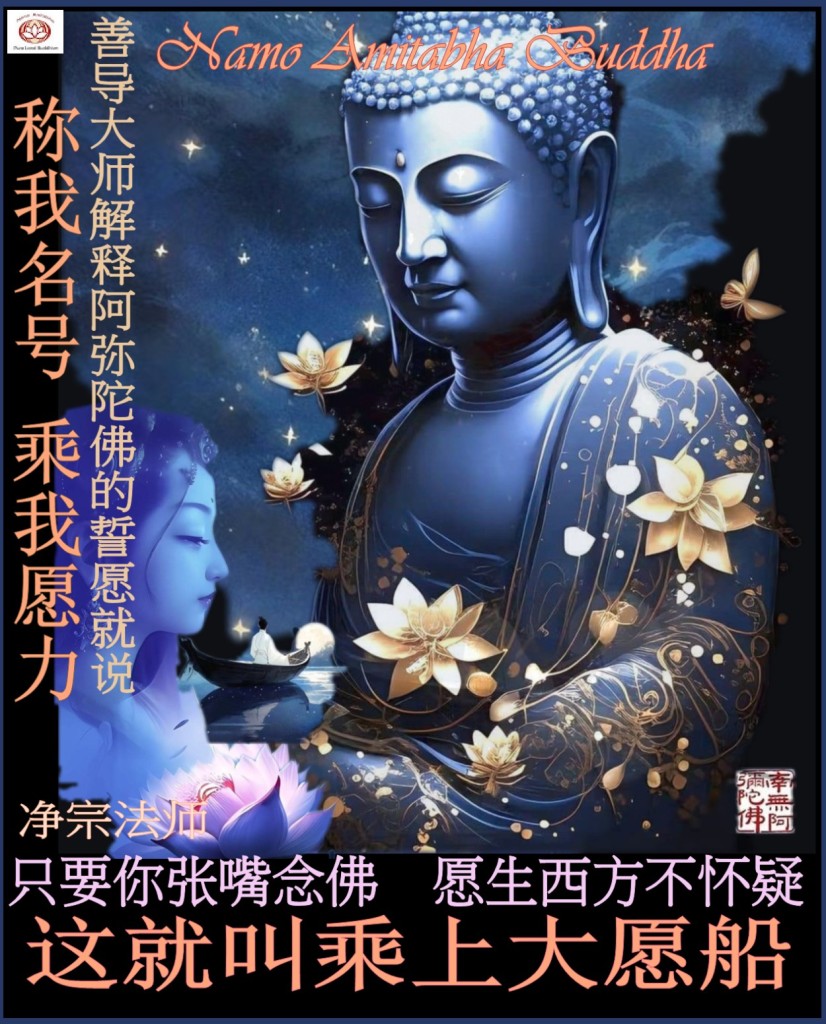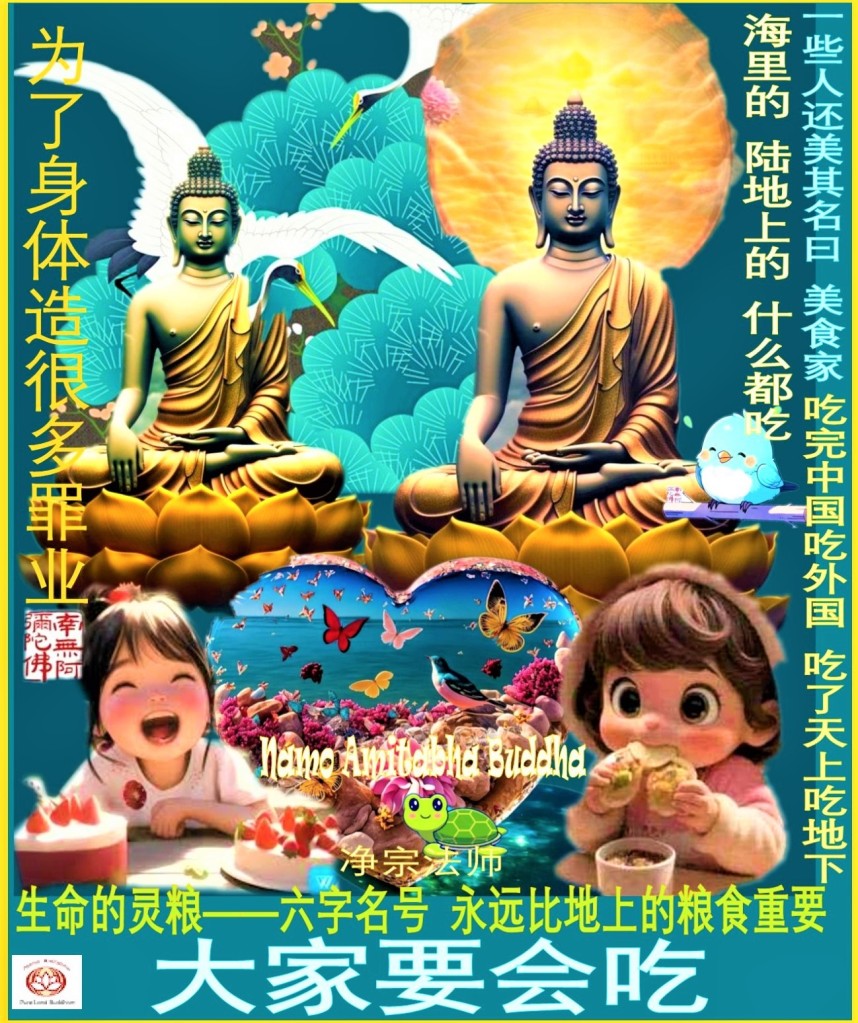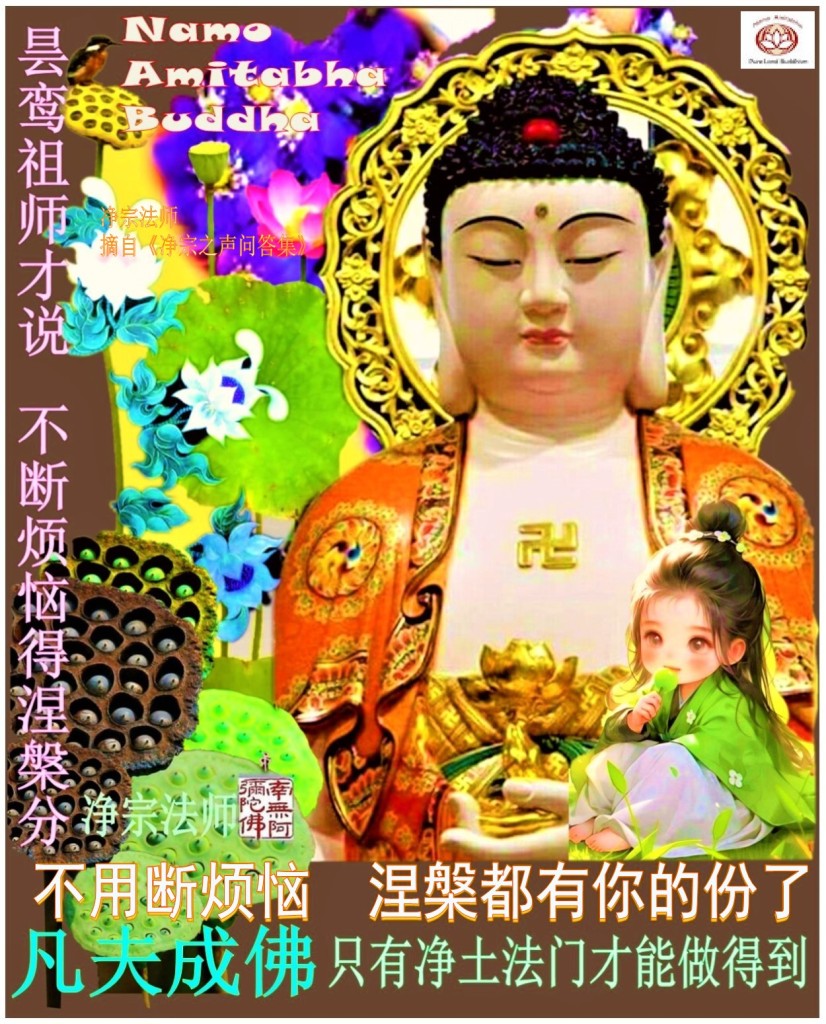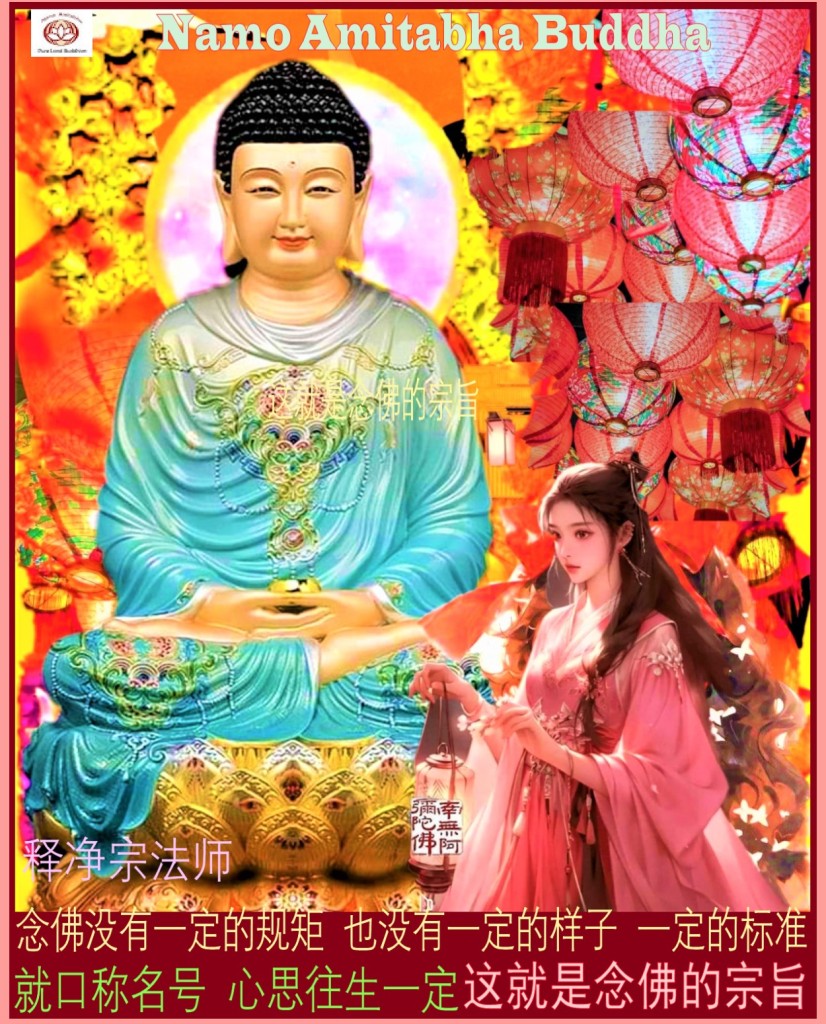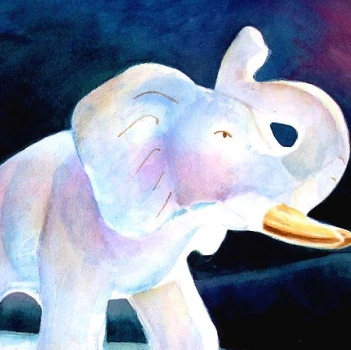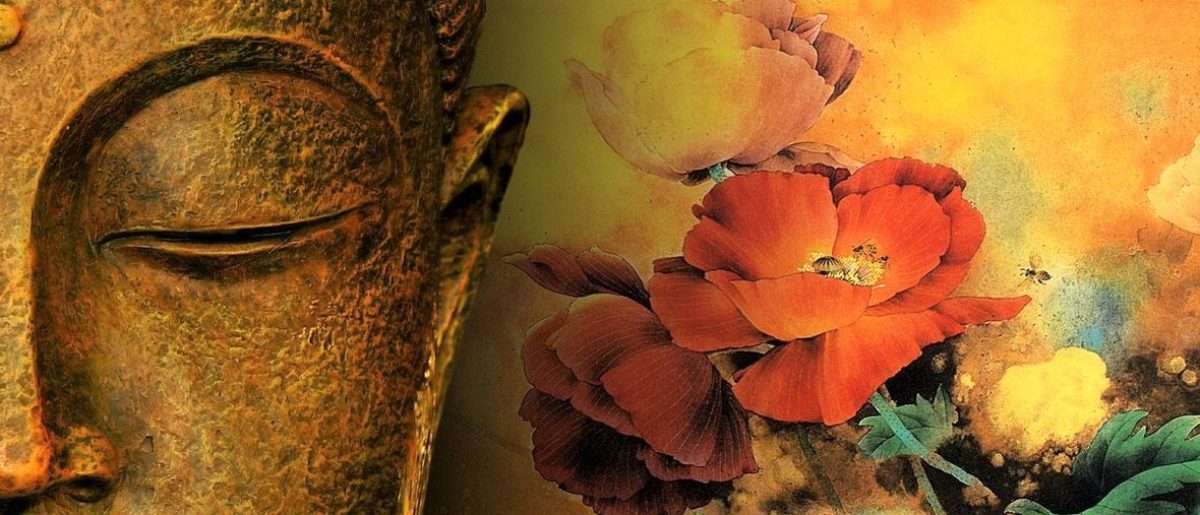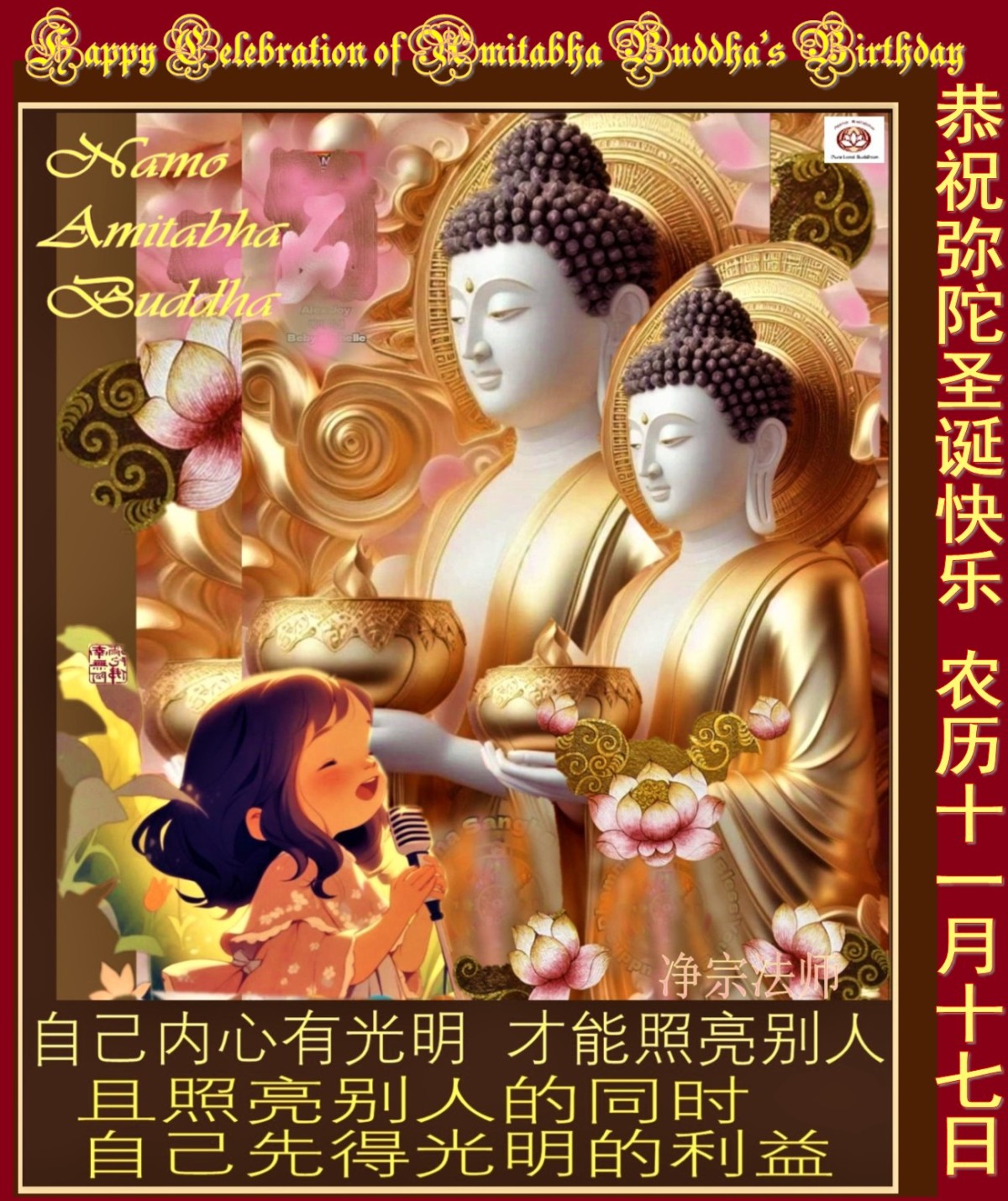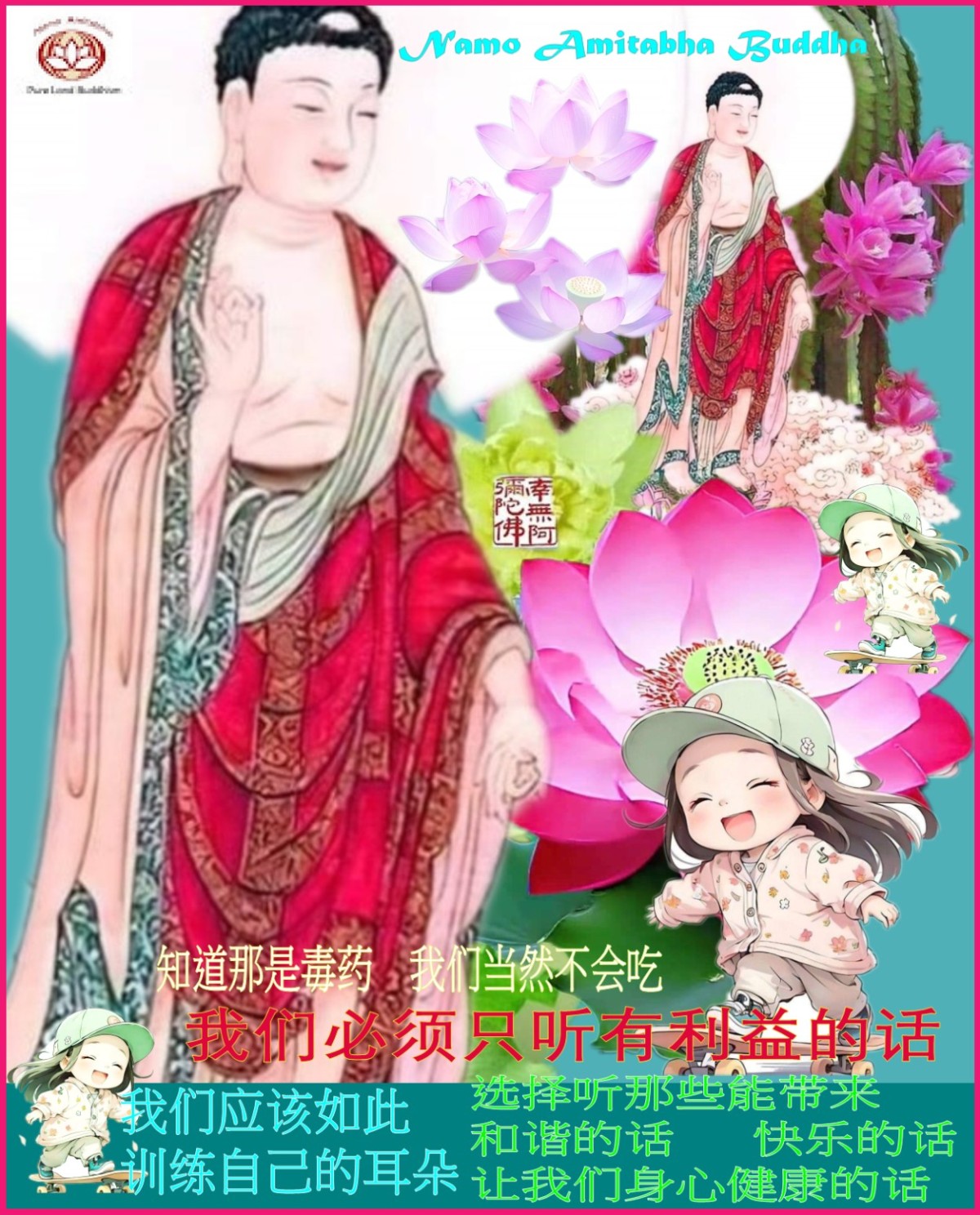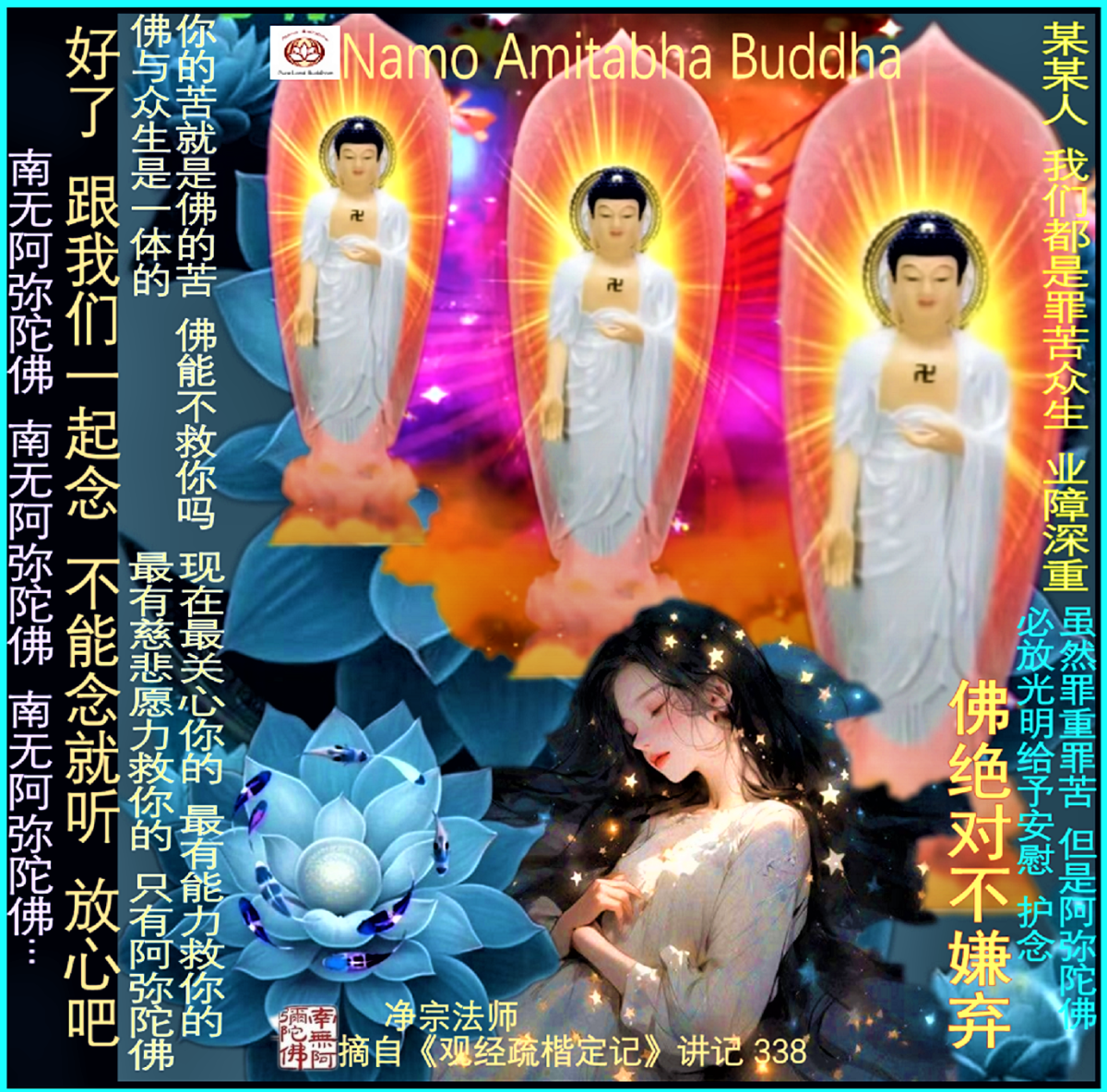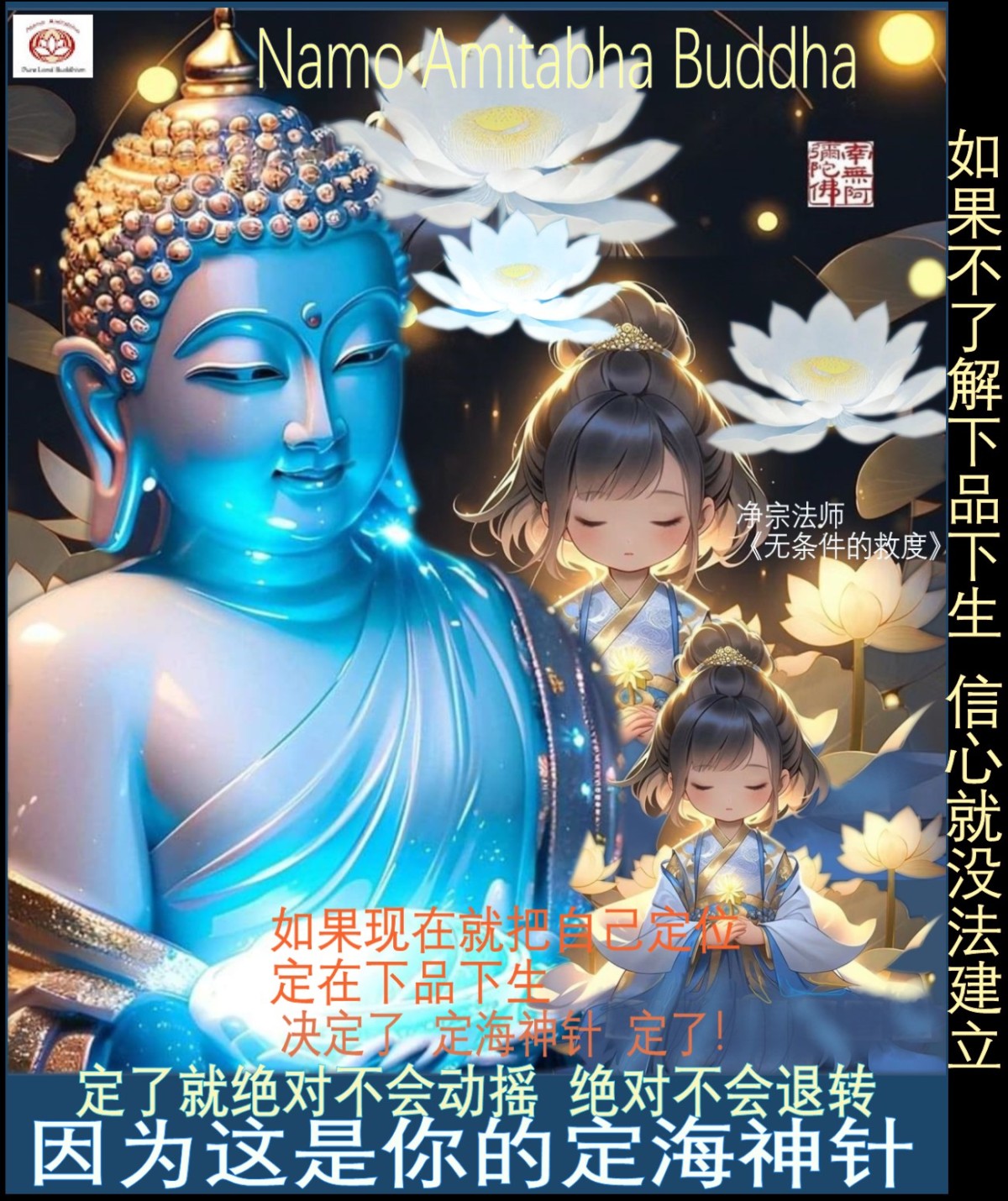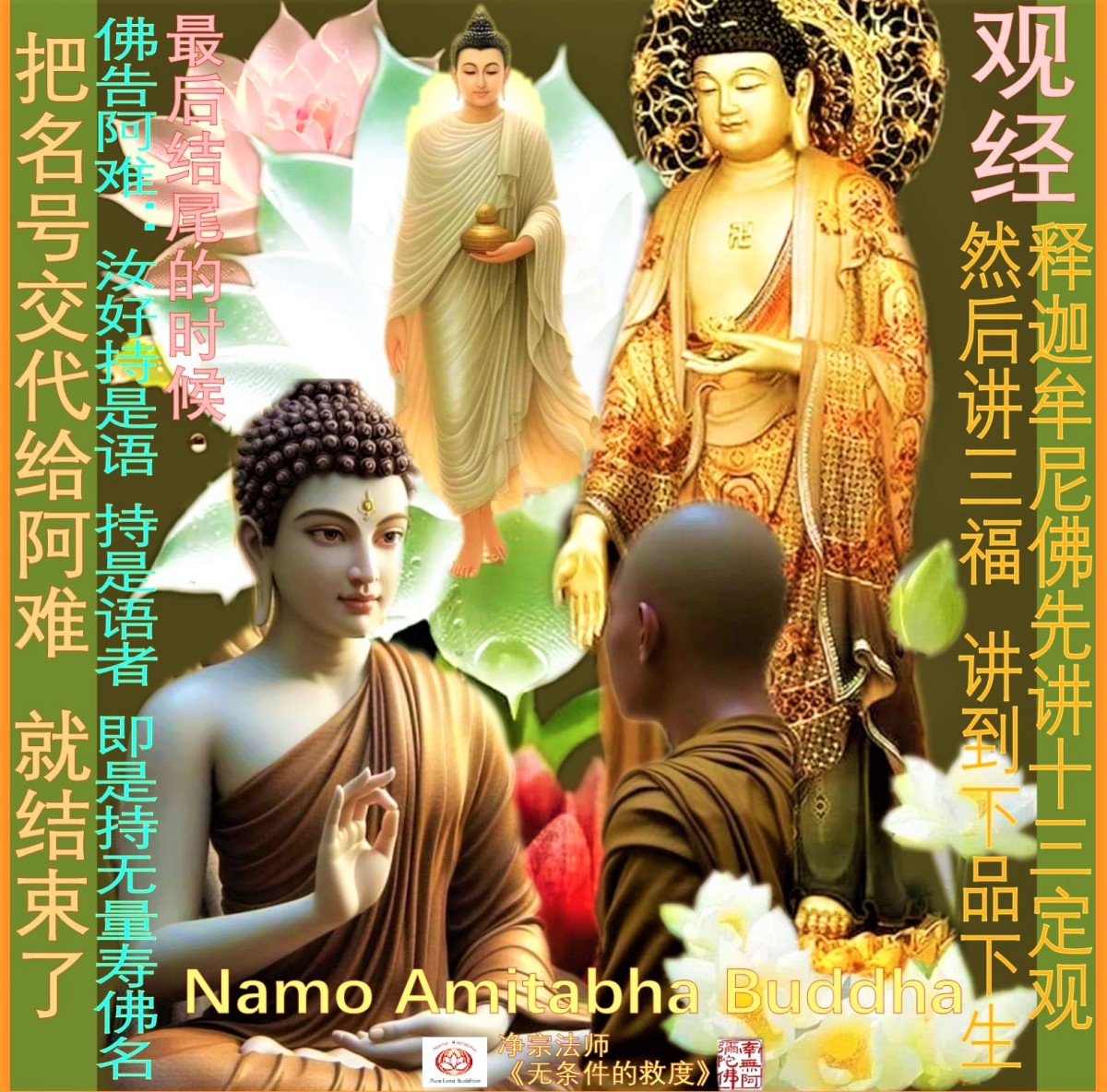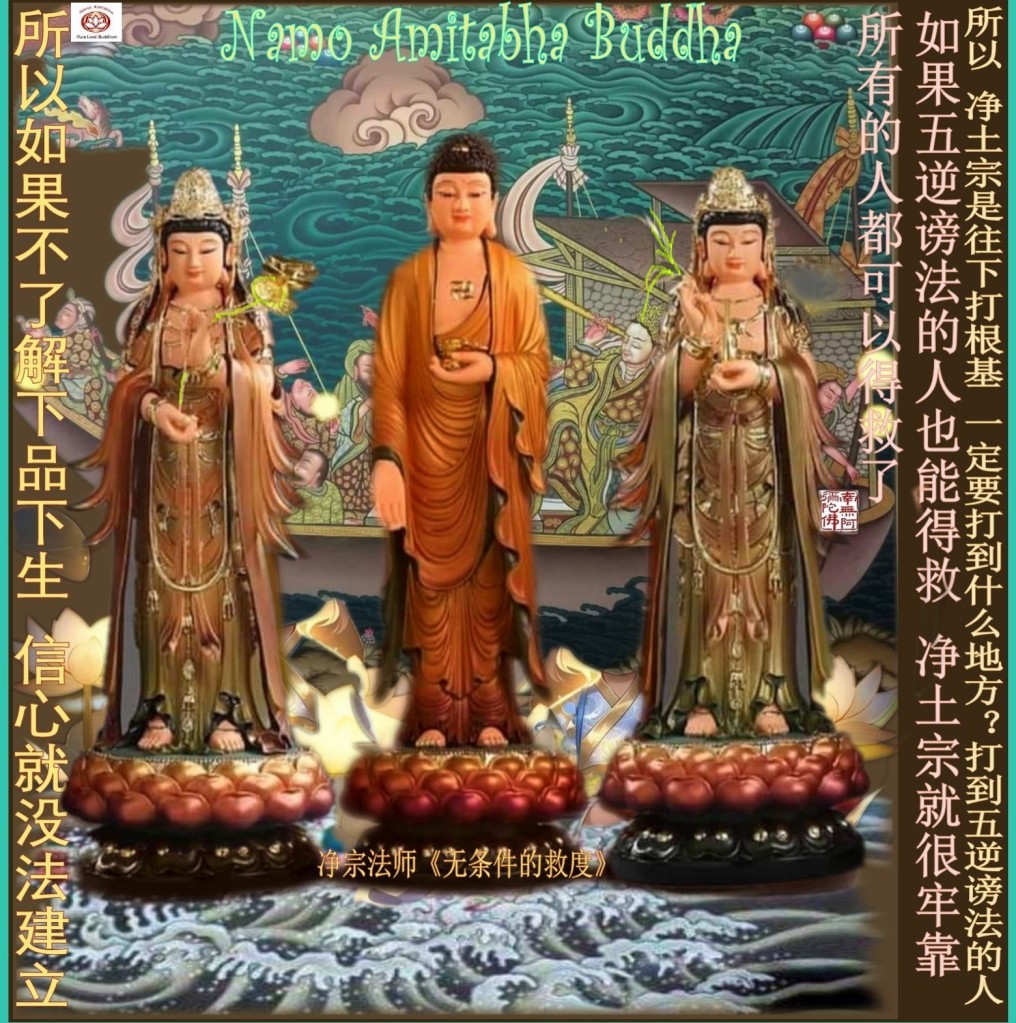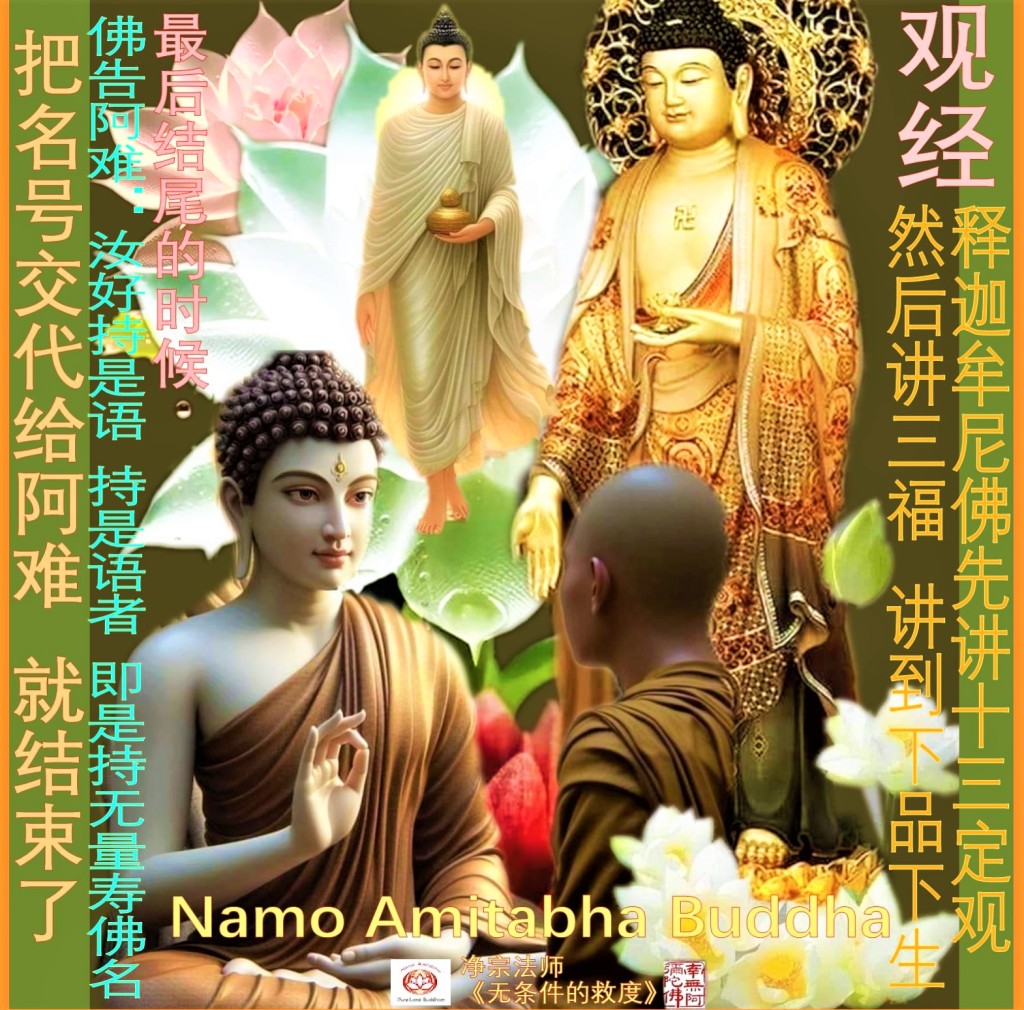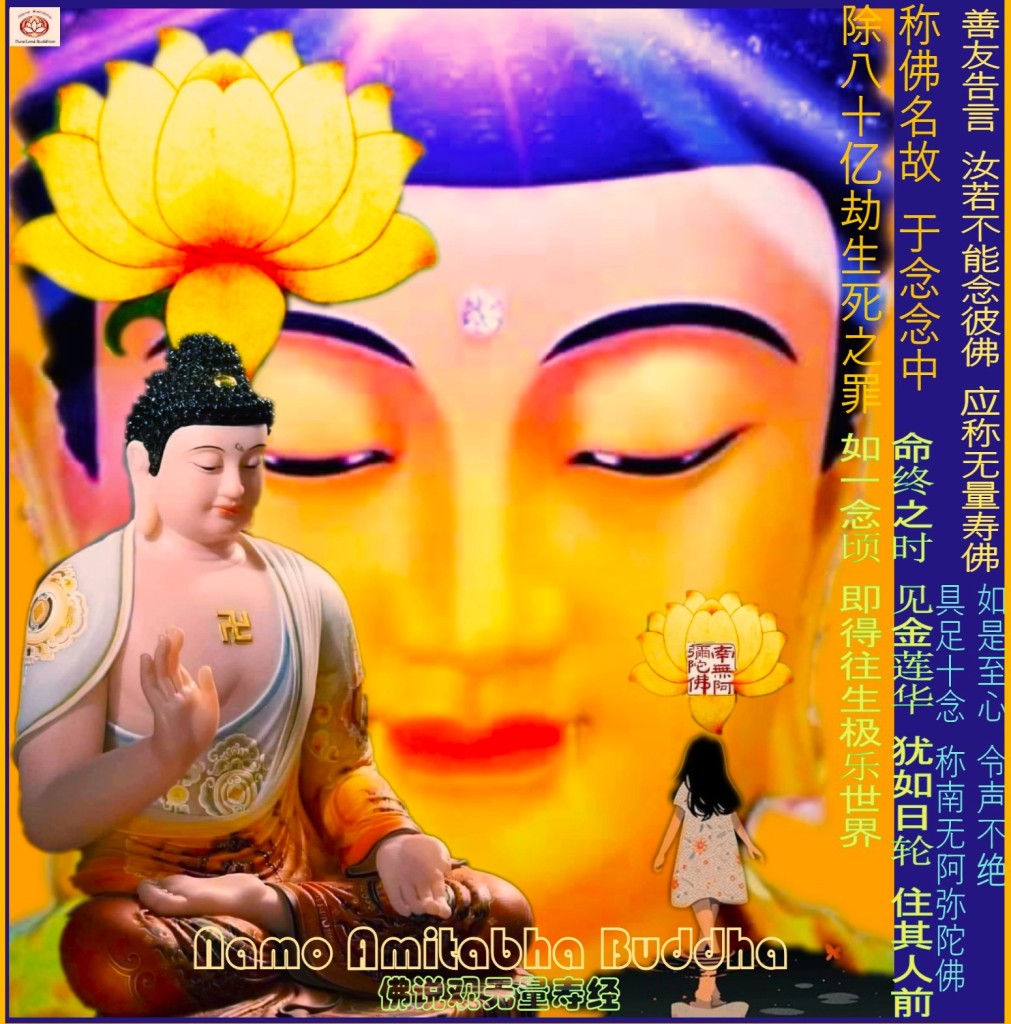Chapter 5 Proper Practice and Mixed Practices
Great Master Shandao differentiates the ‘two practices: Proper, Mixed’ He exhorts us to leave the mixed practices and concentrates on the Proper Practice.
第五章 正行與雜行
—— 善導大師判「正雜二行」勸捨雜行歸正行
1. Great Master Shandao’s differentiation on the Proper Practice and the Mixed Practices.
一、善導大師判正行與雜行
(1) differentiating the practices
Before this we have learnt the ‘difficult practice and easy practice’, ‘self-effort and other’s power’, ‘Sagely path and Pure Land’,
‘Significant Door and Magnificent Vows’. These are the direct differentiations on the teaching of the Dharma Door.
The differentiations of the teachings enable us to be clear in the directions of our practice.
Among the two paths of being difficult and easy, we leave the difficult path and choose the easy path. In the two strengths of self-effort and other’s power, we renounce self-effort and choose other’s power. Among the two Doors of Sagely Path and Pure Land, we leave the Sagely Path and choose Pure Land. In the two Doors of Significant and Magnificent Vows, we direct our practice from the Significant Door to enter Magnificent Vows. By doing so, we would be clear in direction and the line of reasoning.
As a whole how are we going to practise genuinely? Here, Great Master Shandao has also differentiated for us specifically. We are now learning the ‘Proper Practice and the Mixed Practices’. This is followed by the next teachings on ‘Karma of Right concentration and Aided Karma’. This is the differentiation on the practice.
(一)行判
前面我們所學的「難行與易行」「自力與他力」「聖道與淨土」「要門與弘願」,都是直接針對教門所作的判釋——教判。
教判讓我們明瞭方向。難易二道,捨難取易;自他二力,捨自歸他;聖淨二門,捨聖歸淨;要弘二門,從要門入弘願。這樣,方向、理路就明白了。
具體到行持上,又要怎樣落實呢?在這方面,善導大師也給我們作了具體的分判。我們現在要學的「正行與雜行」,以及下一講的「正定業與助業」,正是行持上的分判——行判。
(2) Faith is established in practice
In the Four Primal Teachings of the Contemplation Sutra, there is an explanation on the profound mind: In the establishment of faith in practice, there are two kinds of practice. 1. The proper practice 2. The mixed practices
(二)就行立信
《觀經四帖疏》「深心釋」說:
就行立信者,然行有二種:
一者正行,二者雜行。
‘Establishing faith in practice’- From the karma of practice, the faith of certainty to attain a rebirth is established. There are two types of karmic practices to attain a rebirth. 1. The Proper Practice 2. The Mixed practices. By relying on what kind of practice can our faith be established? From the later explanation, we know that faith is established relying on the proper practice, not the mixed practices. In the Proper practice, our faith is established based on the karma of right concentration, not the aided karmas.
「就行立信」,就行業而建立必定往生的信心。但往生之行業有二種,一者正行,二者雜行。是就什麼行來立信呢?從後面的解釋,我們知道是就正行而立信,而非就雜行;在正行當中,是就正定業而立信,而非就助業。
(3) Differentiating Proper and Mixed practices
(三)正雜分判
Here, Great Master Shandao has differentiated the attainment of a rebirth in the Western Land into two categories: The Proper Practice and the Mixed Practices.
Whether it is the Proper practice or the Mixed practices, they belong to the practices to attain a rebirth. They are the Dharma practices in the Pure Land Door. The aim of their practices is the same as both desires to attain a rebirth in the World of Ultimate Bliss. But they are different in their functions and effects. That is why they are differentiated into proper or mixed. Proper carries the meaning of being pure and straight. Proper practice refers to the practice which is pure, not assorted. It is a practice which go directly to the goal, not meandering. On the contrary, the mixed practices are impure practice. It goes around and meanders without going to the goal directly. We talk about Proper practice and mixed practices, aiming to arrive at our goal, the attainment of a rebirth in the World of Ultimate Bliss. In this appraisal, there is the praise and critics.
這裡善導大師將往生西方之行大判為正行、雜行兩大類。
正行也好,雜行也好,都屬於往生行,都是淨土門之內的行法,在往生極樂這個大目標上一致,但功能、作用不同,以此分出是正還是雜。正,有純正、正直兩種意思。正行即純而不雜之行、直達目標而不彎曲之行。反過來,雜行即不純粹之行,繞彎不直達目標之行。所謂正行、雜行,是就往生極樂這一目標而言的,這種分判是有所褒貶的。
If we only talk about the karma of practice by itself, there is no proper nor mixed. But if they are to be evaluated based on the aim to attain a rebirth in the World of Ultimate Bliss, the practices will be divided into being proper or mixed. For example, some people have black hair, others are with yellow or brown hair and a variety of colours. There are no differences in them whether they are proper or mixed. But once we have fixed the race, there will be the differences of proper or mixed. For the Chinese, it is proper to have black hair. For the Europeans, they take the coloured hair as proper.
單就行業本身,無所謂正雜,但往生極樂這個目標一旦確定,諸行就分出正雜。如同人的頭髮,有黑、黃、棕種種不同,本身無所謂正雜,但人種一定下來,就有了正雜之分,中國人以黑為正,歐美人以彩色為正。
As the aim is different, the proper practice in other sects become the mixed practices in the Pure Land Sect. For example, in meditation, it is the proper practice for the Zen Sect. Upholding the precepts is proper practice for the Sect on Precepts. Halting and contemplating is the proper practice for the Tian Tai Sect. The Dharma Realm Contemplation is the proper practice for the Flower Adornment Sect. When all these practices enter the Pure Land Sect to seek a rebirth with the transference of merits, they become the ‘mixed practices’ as judged by Great Master Shandao.
正因為目標不同,在他宗雖為正行,入淨土即成為雜行。比如參禪,是禪宗正行;持戒,是律宗正行;止觀,是天台宗正行;法界觀,是華嚴宗正行。這些入淨土宗,用來迴向求生極樂,善導大師通通判為「雜行」。
In order not to create misunderstanding in terms of the usage of words, they should be described as ‘the proper practice to attain a rebirth’, ‘the mixed practices to attain a rebirth.’ In brief, they are known as the ‘proper practice’ and ‘mixed practices.’ What is the proper practice?
Talking about the proper practice, it refers to practitioners who practice in accord with the Sutras on attaining a rebirth.
完整而不會誤解的名稱,應該是「往生正行」「往生雜行」,簡稱「正行」「雜行」。什麼是正行呢?
言正行者,
專依往生經行行者,是名正行。
Great Master Shandao has differentiated the Sutras into two categories: The Sutras which teach the attainment of a rebirth and the Sutras which do not teach the attainment of a rebirth. The Sutras which teach the principles to accomplish a sage or a Buddha in this land are ‘not the Sutras of attaining a rebirth.’ The Sutras which teach the attainment of a rebirth in the Pure Land exclusively are known as ‘the Sutras of attaining a rebirth.’
善導大師在這裡把經典分為兩類:往生經,非往生經。不求往生,願在此土成聖成佛的經典,為非往生經;專門介紹往生淨土成佛的經典,稱「往生經」。
Cultivating in accord with the methods in the Sutras which teach the attainment of a rebirth is known as the Proper practice. This is very important! For example, many recites the Vajra Sutra. Is Vajra Sutra the Sutra of attaining a rebirth? From the first word until the end of the Vajra Sutra, not even a sentence is about the attainment of a rebirth in the World of Ultimate Bliss. If you follow the Vajra Sutra and cultivate to seek a rebirth in the World of Ultimate Bliss, this is not known as the Proper Practice.
專門依往生經所講的行持方法來修行,這叫正行。
這裡很重要哦!比如說大家讀誦《金剛經》,《金剛經》是不是「往生經」呢?《金剛經》從頭到尾沒有一句話講到往生極樂世界。那麼,你按照《金剛經》來修行求生極樂世界,就不能叫正行了。
Below are the five types of proper practices: reading, contemplating, making obeisance, reciting, praising,
下面就列了五種正行:「讀」「觀」「禮」「稱」「讚」。
1 The proper practice in reading and reciting / The mixed practices in reading and reciting
Single-mindedly we read and recite these Sutras: Contemplation Sutra, Amitabha Sutra and the Sutra of Immeasurable Lifespan.
1.讀誦正行‧讀誦雜行
一心專讀誦
此《觀經》《彌陀經》《無量壽經》等。
To seek a rebirth in the World of Ultimate Bliss, you should recite these three Sutras exclusively. This is known as the Proper Practice.
In the establishment of the Pure Land Sect, these words are very important. These three Sutras are chosen by Great Master Shandao as the Proper reliance.
求生西方極樂世界,如果讀誦經典,你就專門讀誦這三部經,這叫讀誦正行。
這段話在淨土宗的建立上很重要,這是善導大師為我們選定的淨土正依三部經。
Nowadays, there are people who have suggested the Pure Land Five Sutras. The three Pure Land Sutras are the basis with the addition of ‘the Chapter on the Conduct and Vows of Samantabhadra Bodhisattva’ and ‘the Chapter on the Perfect Penetration of Amitabha recitation by Mahasthamaprapta Bodhisattva.’ They are known as the five Sutras. Actually, the proper reliance in the Pure Land Sect consists of three Sutras, namely the Contemplation Sutra, the Sutra of Immeasurable Lifespan and Amitabha Sutra
現在也有人提倡「淨土五經」。即以淨土三經為基礎,加《普賢行願品》及《大勢至菩薩念佛圓通章》,稱為五經。其實,淨土宗正依經典,只有《觀經》《無量壽經》《阿彌陀經》三部。
‘The Chapter on the Conduct and Vows of Samantabhadra Bodhisattva’ and ‘the Chapter on the Perfect Penetration of Amitabha recitation by Mahasthamaprapta Bodhisattva’ and many other Sutras also tell us about the World of Ultimate Bliss and Amitabha Buddha, supplementarily. But they are incomparable to the three Pure Land Sutras which emphasize exclusively on the attainment of a rebirth in the Western Land. So, they are known as the ‘Subsidiary Sutras.’ ‘Subsidiary’ is opposite to ‘Proper’. They are by the side, not the Proper position. They are not the fundamental references. They act as the aided references. From here we know that the Pure Land Dharma Door of Amitabha Buddha is the Original intention for the World Honoured One to enter the world. The World Honoured One has taught about the Pure Land Dharma in the Sutras of Proper reliance. Besides, he has often mentioned the World of Ultimate Bliss when he is teaching other Sutras.
《行願品》《念佛圓通章》,還有很多經典,雖然都附帶講到極樂世界、阿彌陀佛,但不如淨土三經專講往生西方,這些都叫「旁依經典」。「旁」與「正」相對,就是說在旁邊,不在正位;不是根本依據,是輔助依據。由此可知,彌陀淨土法門是世尊的出世本懷,不僅在正依經典中專講淨土教法,講別的經典時也會時時聯繫到極樂世界。
The three Pure Land Sutras are first mentioned by the Great Master Tan Luan in his ‘Commentary on the Shastra of Attaining a Rebirth.’ But they are not as prominent as mentioned by Great Master Shandao when he talks about the sutras on the ‘attainment of a rebirth’, ‘ the proper practices’, ‘the exclusive reliance’, which are very clear-cut.
淨土正依三部經,最早在曇鸞大師的《往生論註》就提到,不過,沒有像善導大師說得這麼明顯:「往生」「正 行」「專依」的經典,很明朗。
Why are these three Sutras qualified to be called the proper Sutras in the Pure Land Sect, not the other Sutras? This is because these three Sutras teach about the adorned scenery in the World of Ultimate Bliss, the methods to attain a rebirth for the mundane men purely, exclusively and thoroughly. The Format is very pure, without mixing with other subjects. In the ‘Contemplation Sutra’, ‘Amitabha Sutra’, the ‘Sutra of Immeasurable Lifespan’, the whole content is about the World of Ultimate Bliss, about Amitabha Buddha. There is no teaching on how to sit in meditation, how to get enlightened. There is no teaching on them. Only the attainment of a rebirth is described. This is the first reason.
為什麼只有這三部經典有資格稱為淨土宗的正依經典,其他都沒有資格呢?因為這三部經典都是純粹、專門、徹底地講說極樂世界的莊嚴景象以及凡夫眾生的往生方法。形式上,它們很純粹,不夾雜其他,《觀經》也好,《阿彌陀經》也好,《無量壽經》也好,全部都講極樂世界,都講阿彌陀佛,不是教你怎麼參禪、怎麼開悟,不談那些,只談往生:這是第一點理由。
Secondly, these three Sutras are taught in connection with the Original Vows of Amitabha Buddha. The primary content takes the magnificent Vows of Amitabha Buddha as the essential spirit. So, the explanation given by the Great Master Shandao is simple and brief. He has used these three descriptions. He has thus said:
For example, in the Sutra of Immeasurable Lifespan, he explained the forty-eight Vows as ‘Only the exclusive recitation of Amitabha Buddha’s Name to attain a rebirth is mentioned.’ ’Only’ means the only one. In the forty -eight Vows, the only one matter which is mentioned is ‘to recite the Name of Amitabha Buddha exclusively to attain a rebirth.’
第二點,這三部經都貫穿著阿彌陀佛的本願,以阿彌陀佛的誓願作為本質內涵,作為靈魂。所以,善導大師解釋這三部經很簡略,三句話就解釋清楚了,他說:
如《無量壽經》四十八願中,
唯明專念彌陀名號得生。
「唯」是唯一,四十八願說了唯一的一件事:「專念彌陀名號得生」。
Moreover, in this Sutra, the passages on Samadhi and mixed wholesomeness, only the recitation of the Buddha’s Name exclusively enables us to attain a rebirth.
In the Contemplation Sutra, the thirteen contemplation on the Samadhi Wholesomeness, the mixed wholesomeness of three blessings and nine grades, this matter is also mentioned.
又此《經》定散文中,
唯標專念名號得生。
《觀經》定善十三觀,散善三福九品,也是講了這件事情。
Moreover, in Amitabha Sutra, it is said that living beings who recite Namo Amitabha Buddha exclusively for one day or seven days would attain a rebirth. This is the content of Amitabha Sutra.
又如《彌陀經》中,
一日、七日專念彌陀名號得生。
《阿彌陀經》也是講這件事情。
So, this is the Patriarch, the revelation of the transformation Amitabha Buddha who can speak like this, not the common mundane men. Even after listening to his words we are unable to understand. We even disbelieve in these words. But as this is said by Great Master Shandao, people who do not have faith in the teaching would not dare to go against his teaching either.
所以,祖師就是祖師,彌陀示現就是彌陀示現。這些話,不要說一般人講不出來,聽到之後也難以理解,甚至不能相信。但是,因為是善導大師講的,不相信也不敢反對。
Some people have thus said, ‘In the Contemplation Sutra, lots of teachings on the Doors of Samadhi and mixed practices are taught. Why did the Master say only one thing is mentioned? Even in the forty-eight vows, lots of words are said….’ But as
this is taught by Great Master Shandao, who is the revelation of Amitabha Buddha, what we should do is to ponder over his words carefully.
有人說:「《觀經》定散門中講了很多,怎麼說就講了一件事情?四十八願也講了很多啊……」但是,彌陀示現的善導大師這麼講,那我們就要好好思維。
Relying on our wisdom it is known as the ‘obstacles of words.’ We cannot penetrate the meaning of the words. But Great Master is able to penetrate the essence of the teaching by looking at the words. He could see the core teaching of the content: that is, he understands the aim, the core teaching for teaching the Samadhi wholesomeness, the mixed wholesomeness—is to lead us to the exclusive recitation of the Name of Amitabha Buddha to attain a rebirth. So, the three Sutras consist of the same aim: the recitation of the Amitabha Buddha’s Name exclusively to attain a rebirth in the Western Pure Land. The other Sutras do not have such special features. So, they cannot be taken as the proper basis in the Pure Land Sect.
如果依我們的智慧,叫作「文字障」,死於句下。善導大師是透過文字看本質,看到核心內容:定善、散善所指向的核心目標——專念彌陀名號得生。所以,這三部經是同一個宗旨:專念彌陀名號往生西方淨土。其他一切經典,不具備這樣的特點,因此不能作為淨土宗的正依經典。
Everyone should pay attention to this: When we learn the Dharma, we should first base on the Proper Sutras as the basis of reference. For example, if we want to specialize in computer science at the University, we should equip ourselves with the books on computer major. Only then, we can study well. But if you read the book on the cultivation techniques for high yield of fruit trees, this is totally out. In Buddhism, there are lots of specialization, many sects. We are learning the Pure Land Sect exclusively, seeking to attain a rebirth in the Western World of Ultimate Bliss. So, the proper books of reference should be based on the three Pure Land Sutras as reference. But if you bring along the Vajra Sutra. What do you think? Is the Vajra Sutra very good? Of course, it is good! Is the Dharma Flower Sutra good? Yes, it is. They are all very good! But they are not the proper sources of reference for us. So, in the learning of the Pure Land Sect to seek a rebirth in the Pure Land of Ultimate Bliss, we should rely exclusively on the three Pure Land Sutras, not other Sutras. We do not even simply make reference from them. This is because we do not have the wisdom. Once we have made the reference, we might become confused over the aims. We do not know which side we should take. Finally, we feel as though we are so perfect in the assimilation of the content. Consequently, we are uncertain in our attainment of a rebirth.
大家要注意:學法,首先要有正依經典為依據。比如說我們到大學讀書,如果學電腦專業,就要拿電腦專業的課本來學習,這樣才學得好。學電腦專業,結果拿來一本《果樹栽培技術》,這就不相干了。佛教也有很多專業、很多宗。我們是專學淨土宗的,是求生西方極樂世界的。我們的正版教科書就是淨土正依三部經。你拿來《金剛經》——《金剛經》好不好?當然好!《法華經》好不好?當然好,都好!但是這些都不是我們的正依經典。所以,學淨土宗,求生極樂淨土,專依淨土三經,不依其他諸經,甚至也不隨便參考。因為我們沒有智慧,只怕一參考就雜了,宗旨模糊了,兩頭不靠,還自以為圓融,結果往生不定。
We should avoid making reference from other Sutras, other than the three Pure Land Sutras, to create obstacles in the Pure Land Sect. As the specializations are different, the aims are different, the Dharma Doors are different, the root potentials are different, the benefits are different. Everyone can tread his own path. So, Great Master Shandao had greatly exhorted us to recite the three Sutras exclusively as this is the Proper Practice in reading, recitation. ‘On the contrary, reading and reciting other Sutras other than these three Sutras are all known as the mixed practices in reading and reciting.
更不要引用淨土三部經以外的經典來妨難淨土宗,因為專業不一樣,宗旨不一樣,法門不一樣,對機不一樣,利益不一樣,各有道路。所以,善導大師才苦口婆心地勸我們「你要專讀誦這三部經,這是讀誦正行」。反之,讀誦這三部經以外的經典,通通是讀誦雜行。
Reading and reciting the three Pure Land Sutras is the Pure Practice of Ultimate Bliss, without a mixture. It directs us towards the Western direction, not other directions. It is straight without meandering. That is why it is the proper practice. If we read and recite other Sutras to seek a rebirth in the World of Ultimate Bliss, the content is not pure as it is not connected with the World of Ultimate Bliss, this is the mixed practice. The effect of such a practice is indirect as it does not lead us straight to the Pure Land. We have to take a U-turn to go to Pure Land. This is meandering, not a direct Path.
讀誦淨土三經,是純粹的極樂之行,純而不雜;直向西方,不向他方,直而不曲,所以是正行。如果我們讀誦其他經典迴向求生極樂,內容不是純與極樂相關,就雜了;功效上,不直達淨土,要迴轉趨向,這就拐彎了,就不是正直的了。
For example, we are travelling by train from Chang Chun to Beijing, we should check the time table for the train and time. Surely, you will turn to the page of Changchun to Beijing. When you have found the page, this is called the correct way. This is known as the ‘proper practice of reading and reciting’ as you will read this page. Oh! The frequency of the train from Chang Chun to Beijing consists of so many shifts, with the respective time…. If you do not turn to this page, instead, you open the page on the journey from Changchun to Harbin, you are going in the wrong directions. You need to travel from Harbin to Beijing, taking a detour.
比如說我們從長春要到北京去,坐火車的話,就要查看列車時刻表,看看坐哪一班車。那麼,你一定是翻看從長春到北京這一頁,翻到這一頁,對你來講,就叫作翻正確了,就算是「讀誦正行」了,就讀這一頁。哦,原來長春到北京,共有多少班次,各在幾點……結果你不翻到這一頁,而翻到從長春到哈爾濱那一頁,那就南轅北轍了;要再從哈爾濱轉到北京,這就拐彎了。
We are going to the World of Ultimate Bliss. If we desire to learn the Sutras, what are the Sutras we should look for in the Great Canon of Sutras? We should look for the three Pure Land Sutras. These Sutras tell us the way to go to the World of Ultimate Bliss. This is right then. But if you open a Sutra which does not tell you the way to attain a rebirth in the World of Ultimate Bliss, then you said, ‘I am seeking a rebirth in the Western World of Ultimate Bliss. But I am taking this Sutra which does not teach anything on the attainment of a rebirth into the World of Ultimate Bliss as a compass of direction.’ This is being improper. This is the meaning of the ‘Proper Practice in reading and reciting.’
我們是要到極樂世界去,如果修學經典,就要在《大藏經》裡翻哪幾部經典?淨土三部經。這幾部經是告訴我們怎麼到極樂世界去的,這就看對了。結果你翻開一部經典,從頭到尾沒有一句話講到往生西方極樂世界,你說:「我求生西方極樂世界,我就是要看這本從頭到尾沒有一個字講往生極樂世界的經典,作為我修行的指南。」這就不正確了。這是講「讀誦正行」。
Anyway, I would like to elaborate on this point. Since the reading and recitation of these three Sutras are known as the Proper Practice, can we read other Sutras? Is it fine to read them? After reading, is this considered the mixed practices? We should differentiate here.
不過,這一點,我想再多解釋幾句。既然只有讀誦這三部經叫作讀誦正行,其他經典可不可以讀呢?能不能讀呢?讀了算不算雜行呢?這就要分辨了。
As a practitioner of the Pure Land Sect, firstly he must have profound faith in cause and effect. So, if you read the Sutras or books on cause and effect, the corresponding rewards and retributions, this is not the mixed practices as they help us to despise the Saha World, to seek a rebirth in the World of Ultimate Bliss. Having profound faith in causes and effects refers to our knowledge on the working of causes and effects. If we do not take care of the three karmas, we will surely fall. This type of reading is beneficial as they are the foundation of the Buddha Dharma. They are not considered as mixed practices. Besides, the study of the work of Great Master Shandao, Great Master Dao Chuo, Great Master Tan Luan is the Proper practice too. This is not mixed practices. This is because if we do not study these ancient teachings, we cannot understand the three Sutras. Besides, those who have already practised the exclusive recitation of Namo Amitabha Buddha by relying on the teaching of the three Sutras can also read the Dharma Flower Sutra, the Nirvana Sutra and other Great Vehicle Sutras and Shastra in order to have a basic understand of the Buddha Dharma. These are the expedients which enable them to teach and transform living beings. This is not considered as mixed practices.
作為一個淨土宗的行人,首先要深信因果。所以,凡是看關於因果報應方面的經典、書籍,不算雜行,它能夠讓我們厭離娑婆,求生極樂。深信因果,知道如是因如是果,三業不慎就要墮落,這是有幫助的,是基礎課,這不算雜行。還有,讀誦善導大師、道綽大師、曇鸞大師的著作,當然也是正行,不是雜行,因為這些舊作如果不讀的話,我們看不懂三部經。還有,已經依三經專修念佛了,但是為了方便度化眾生,想對整個佛法有一個通體的認識,而讀誦《法華經》《涅槃經》等大乘經論,這也不算雜行。
What is meant by mixed practices? You feel that just by reciting Namo Amitabha Buddha alone cannot attain a rebirth. So, you read and recite other Sutras and mantras, accruing the merits and virtues to help you to attain a rebirth. With these mixed practices, you feel they can help you to attain a rebirth. This type of thinking and actions are known as the mixed practices.
什麼算雜行呢?心中認為單念佛不能往生,用讀誦其他經咒的功德來輔助,把它夾雜進來,以為這樣能幫助往生,這樣的想法所引導的行為,就叫作雜行。
For the common practitioners of the Pure Land Sect, it is unnecessary to seek a lot of knowledge, to study widely and expansively. They should first seek to practise exclusively, solely in profundity. They should thoroughly understand and penetrate the three Pure Land Sutras, the series of ideology in accord with the Great Master Shandao’s teachings. Even though they also desire to study other Sutras. they should consider the time factor. If they do not have the time they can go to the World of Ultimate Bliss to study. If they have the time, they can study briefly. I guess many people are in lack of time as they are getting older. They are getting nearer to the time to attain a rebirth.
一般的淨土宗行人,不必求多、求廣、求博,先求專、求精、求深,老老實實將淨土三部經、善導大師這一系列思想深入瞭解,把握穩當。其他經教雖然也想讀,如果沒有時間,就留到極樂世界再讀。如果有時間,可以略微看一點。估計很多人是越來越沒有時間了,因為年紀越來越大了,離往生越來越近了。
2 The proper practice in Contemplation / The mixed practices in Contemplation
2.觀察正行‧觀察雜行
With exclusive single mindfulness, we contemplate and concentrate and direct our mind on the two adorned rewards in that Land. In the five types of proper practices, the words ‘exclusive single mindfulness’ are mentioned. Here, it is described as ‘exclusive single mindfulness and concentrate on’. From here we can see how Great Master Shandao has stressed on ‘exclusiveness’ especially.
一心專注思想、觀察、憶念彼國二報莊嚴。
五種正行都說到「一心專」,這裡說「一心專注」,可見善導大師是如何強調「專」。
‘mindfulness’ refers to the imagination. But this is not to imagine as we like. We channel our thought in accord with the descriptions in the Pure Land Sutras which we have read and recited. For example, in the reading and recitation of Amitabha Sutra, we think about the four types of lotus flowers in the World of Ultimate Bliss, the green lotus emits the green lights, the yellow lotus emits the yellow lights, the red lotus emits the red light, the white lotus emits the white lights. Some people are rich in their imagination while others are weak. But every one can imagine as he understands.
「思想」:即一般所講的想像,但不是自己想像,而是依據所讀誦淨土經典的描述。比如讀誦《阿彌陀經》,隨經文想像極樂世界四色蓮花——青色青光,黃色黃光,赤色赤光,白色白光。有人想像力豐富,有人相對簡單,但總會有所想像。
‘Contemplation’: Putting down the Sutra, we sit in the proper posture and contemplate. Putting all the worries to rest, we bring the mind into concentration. There are the differences in being refined, coarse, bright and dark. Our contemplation starts from being coarse and then it becomes refined, from darkness into brightness. When the mind and states are in coherence, this is known as the Samadhi of Right contemplation.’
「觀察」:放下經本,端坐入觀,息慮凝心;也有精粗明暗之別,由粗轉細,從暗到明。心境相應,即稱三昧正受。
‘directing our mind on them.’: This is to remember the thoughts as mentioned before. We contemplate on the states and uphold them in our mind continually, without abandoning.
「憶念」:追憶前面思想、觀察之境,持念在心,相續不捨。
‘the two adorned rewards in that Land’: This refers to the myriad adornment of merits and virtues of dependent rewards and the Proper rewards in the World of Ultimate Bliss
「彼國二報莊嚴」:極樂世界依報、正報種種功德莊嚴。
‘mindfulness, contemplation, directing our mind on them’ belong to the proper practices in Contemplation. No matter how inferior a man can be, if he wants to be born in the World of Ultimate Bliss, he will still have a little proper practice in contemplation. Besides, on encountering the states and conditions, he will despise the Saha world and admire the Land of Ultimate Bliss. This is also the proper practice of contemplation. For example, when he goes out, he will think,
‘It is so noisy outside! The World of Ultimate Bliss is without noise. There is only the Dharma sound.’
‘It is so smelly here. The World of Ultimate Bliss is very fragrant.’ ‘Here, the winter is so cold. The World of Ultimate Bliss is not cold.’ ‘Oh dear! I am nearly knocked down by the car. Dangerous! There is no road accident in the World of Ultimate Bliss.’ All these are the proper practice of contemplation. While reading the newspaper, watching the television, very often we will read about killing, stealing, sexual misconduct, false speech, evil men, evil sound. The World of Ultimate Bliss consists of ‘All the very good men stay together’ All of them are Bodhisattvas. There are no evil matters, no bad names ultimately. Everything that happens here will lead us to think about the World of Ultimate Bliss.
思想、觀察、憶念都屬於觀察正行。再怎樣愚劣的人,願生極樂,多少也會有觀察正行。另外,觸境逢緣,厭離娑婆,欣求極樂,也是觀察正行。比如一出門,「外面噪音這麼大!極樂世界沒有噪音,都是法音」;「這裡氣味這麼難聞,極樂世界很香」;「這裡冬天這麼冷,極樂世界不冷」;「哎呀,車差點把我撞了,好險!極樂世界沒有交通事故」。這些都是觀察正行。打開報紙、電視,總是殺盜淫妄,惡人、惡聲。極樂世界是「諸上善人俱會一處」,都是菩薩,絕無惡事、惡名:任何事情都讓我們想到極樂世界。
In the cultivation of the mindfulness, contemplations and the directing of thoughts are not on the two rewards of the World of Ultimate Bliss, that we cultivate the contemplation of Conscious Only, the contemplation of the Dharma realm, the contemplation of Buddha Lands of other directions, this is known as the mixed practices in Contemplation.
如果是思想、觀察、憶念極樂二報之外的修行,觀唯識、觀法界、觀他方淨土等等,叫作觀察雜行。
Of course, as I have just said, the contemplation of sufferings, emptiness, impermanence is the basic education as they enable us to despise the Saha world, to seek rebirth in the World of Ultimate Bliss. This is not considered the mixed practices. It is because once we realize the sufferings of life, the emptiness and impermanence of life, we will surely recite the Buddha’s Name, Namo Amitabha Buddha exclusively. We are willing to seek a rebirth in the Nirvana Land of permanence, bliss, self and purity.
當然,剛才講過了,觀苦,觀空,觀無常,這都是基礎教育,能讓我們厭離娑婆,求生極樂,不算雜。體會到苦空無常,就一向專念彌陀佛名,求生常樂我淨之涅槃國土。
3. The proper practice in making obeisance / The mixed practices of making obeisance
3.禮拜正行‧禮拜雜行
If we want to make obeisance, we will only bow to that Buddha. In making obeisance, we will single-mindedly make obeisance to Amitabha Buddha. This is known as the proper practice in making obeisance.
If you feel that it is not enough to make obeisance to Namo Amitabha Buddha only. We should make obeisance to all the Buddhas and Bodhisattvas whom we know. This is known as the mixed practices in making obeisance.
若禮,即一心專禮彼佛。
禮拜,就一心專禮彼阿彌陀佛,這叫禮拜正行。
如果覺得專拜阿彌陀佛可能不夠,所以其他佛菩薩,只要知道的,都要拜,這就是禮拜雜行。
Amitabha Buddha is the Buddha of Rescue. All the Buddhas and Bodhisattvas bestow upon us the kindness of their sincere authentication. So, we should make obeisance to them. But there is a difference. We should make obeisance to Amitabha Buddha exclusively, as often as possible because our aim is to attain a rebirth. We also make obeisance to other Buddhas, Bodhisattvas in accord with the conditions, once in a while. This is because of their kindness in bestowing upon us their sincere authentication. For example, when we go to the temples which do not practise the exclusive recitation of Namo Amitabha Buddha, that they have put up the Sakyamuni Buddha, Maitreya Buddhas, Avalokiteshvara Bodhisattva, the Ksitigarbha Bodhisattva and others, we should make obeisance respectfully in accord with conditions.
阿彌陀佛是救度的佛,諸佛菩薩有證誠之恩,都應禮拜,但有所區別。阿彌陀佛是專門拜,經常拜,目的是為往生;其他諸佛菩薩是隨緣拜,偶爾拜,用意在於感其證誠之恩。比如到了一般寺院,若不是專修念佛的道場,所供的有釋迦、彌勒、觀音、地藏等等,那就隨緣恭敬禮拜。
As we are practising the Pure Land Sect exclusively, we should make offerings to Amitabha Buddha exclusively, bow to Amitabha Buddha exclusively. The most we can pray to the three Sages of the Western Land. Do not mix up your practice. By looking at the Buddha Hall, we will know of his faith, whether it is profound or shallow. If there are so many Buddhas and Bodhisattvas, you will know he is a beginner. He does not have law and rules. He is yet to find the Dharma Door of cultivation. There is no Master in his mind. If his mind has a Master, his Buddha Hall will surely be simple, adorned and exclusive. This is because one is able to represent all.
我們專修淨土宗,就專供阿彌陀佛,專拜阿彌陀佛,頂多西方三聖,不要雜。看一個人的佛堂,就知道他的信仰深淺。如果很亂,很雜,什麼佛菩薩都有,就知道他還是初學,沒有章法,沒有找到修持的法門,心中沒有主人。心裡如果有主的話,佛堂就很專一,簡潔莊嚴,以一代一切。
4. The proper practice of Amitabha recitation/ The mixed practices in recitation
If we recite Namo Amitabha Buddha with our mouth, we should recite it exclusively, single-mindedly. This is known as the proper practice of Amitabha recitation.
For the sake of attaining a rebirth in the Western World of Ultimate Bliss, if we feel it is not enough that we only recite Namo Amitabha Buddha, we will surely recite the Names of other Buddhas and Bodhisattvas. This is a mixture of all the Buddhas’ names. This is known as the mixed practices of recitation.
The Buddhas, the Bodhisattvas only wish that we should be simple, very simple. But we like to be complicated and finally we become very complicated. The Genuine Truth is very simple. The myriad Dharma will become one Dharma, not two. If there are two, they are not the Genuine Truth. So, in the Pure Land Dharma Door, we talk about ‘one’: One Buddha, One Dharma, One Pure Land. When we recite Namo Amitabha Buddha exclusively, this is known as the proper practice of Amitabha recitation.
4.稱名正行‧稱名雜行
若口稱,即一心專稱彼佛。
如果口稱名號,就一心專稱阿彌陀佛名號,這叫稱名正行。
為了往生西方極樂世界,覺得單念阿彌陀佛一佛不夠,再念別的菩薩,再念別的佛,這樣夾雜進去,這叫稱名雜行。
佛菩薩都是讓我們簡單、更簡單;我們自己呢,就喜歡複雜、更複雜。真理很簡單,萬法歸一,沒有兩樣。如果有二,就不是真理。所以,淨土法門講「一」:一佛,一法,一淨土。一心專稱阿彌陀佛名號,這是稱名正行。
5.The proper practice in praising and making offerings/The mixed practices in praising and making offerings
When we are praising and making the offerings, we do so single-mindedly, exclusively in praising and making offerings.
While praising and making offerings, we sing the verses of praise, we make the offerings to Amitabha Buddha and the adorned sagely assemblies of the World of Ultimate Bliss if we choose to cultivate exclusively to attain a rebirth in the Pure Land of Ultimate Bliss. Do not be mixed in your practice.
5.讚歎供養正行‧讚歎供養雜行
若讚歎供養,即一心專讚歎供養。
讚歎供養,比如說我們唱讚,我們設供,如果就往生極樂淨土專修行法來講,就一心專讚歎供養阿彌陀佛、極樂世界聖眾莊嚴,不必雜。
A lay man who practises the Buddha Dharma at home often take the temple as a standard of reference. Whatever that is conducted in the temple will be carried out at home. This should not be the case. This is because you are staying at home, you can make your own decision. It is the best if you recite Namo Amitabha Buddha exclusively. In the temple, the way place, there are lots of people who are of various root potential. There is an exception if the way-place has their own aim and criterion. Otherwise, most of them would make offerings to all the Buddhas, Bodhisattvas in general. They recite the Sutras, upholding the mantras and also Amitabha recitation. For us, we must grab at the true element, that is the root core. If it is practical and is in accord with the criterion of exclusive recitation of Amitabha recitation, we do not need to learn many. Make sure that you do not slander others also because the existence of such practices has its values and meanings too.
在家居士學佛,往往會以寺院為標準,寺院裡搞什麼,他也搞什麼,那倒沒必要。因為你在家,你就可以自己一個人做主,專修念佛就好。寺院道場,來的人多,根機各有不同,除非這個道場本身有它的宗旨、定規,不然都是普遍性地供奉諸佛菩薩,誦經,持咒,也念佛。對我們來講,要抓住實質,抓住根本的、實用的、符合念佛專修原則的,不必學很多;也不要去誹 謗,因為這些有它存在的價值和意義。
(4) The sequential relationship of the five types of proper practice
We will go through the five types of proper practice briefly:
1. The proper practice of reading and reciting: We will read and recite the Sutra of Immeasurable Lifespan, the Contemplation Sutra and Amitabha Sutra.
2. The proper practice of contemplation: We exclusively contemplate the adornments of the World of Ultimate Bliss and admire the Pure Land of Ultimate Bliss.
3.The proper practice of making obeisance: We make obeisance to Amitabha Buddha exclusively.
4. The proper practice of recitation: We recite Namo Amitabha Buddha exclusively.
5. The proper practice of praising and making offerings: We praise and make offerings to Amitabha Buddha exclusively.
(四)五種正行的次第關係
這五種正行,我們簡單地複習一遍:
1.讀誦正行:專門讀誦《無量壽經》《觀經》《阿彌陀經》。
2.觀察正行:專門觀察極樂莊嚴、欣慕極樂淨土。
3.禮拜正行:專門禮拜阿彌陀佛。
4.稱名正行:專門稱念阿彌陀佛的名號。
5.讚供正行:專門讚歎供養阿彌陀佛。
In the explanation of these five types of proper practice, Great Master Shandao has added these words, ‘single-mindedly, exclusively’. This is to be very earnest, that we should conduct the practices single-mindedly, exclusively. Single-mindedly means exclusiveness. When we are exclusive in practice, we will be able to have single-mindedness.
解釋這五種正行,善導大師都在前面加了三個字:「一心專」。很懇切,讓我們要一心,要專。一心就是專,專才能一心。
The sequential relationship in these five proper practices
這五種正行,互相之間有次第關係。
The proper practice of reading and reciting is placed at the first place. Without the three Pure Land Sutras, no one will know the kind and compassionate Vows of Amitabha Buddha. No one will know the appearance of the World of Ultimate Bliss. No one will know by reciting Namo Amitabha Buddha we can attain a rebirth. The three Pure Land Sutras are the fundamentals of the Pure Land Teachings. That is why we must first study and recite the three Pure Land Sutras. By reading the Sutras, we will be able to contemplate. When we read and recite the Sutra passages, the proper and dependent adorned rewards of the World of Ultimate Bliss will appear in our mind. This is the way to enter the proper practice of contemplation. From the contemplation, faith will arise in us. By contemplating the adornments in the Pure Land of Ultimate Bliss, we will be able to understand the strength of Amitabha Buddha’s kind and compassionate vows. Naturally, admiration arises in us and we wish to attain a rebirth. We will make obeisance to Amitabha Buddha and take refuge in him. After we have given up our life to Amitabha Buddha, we should act in accord with the power of Amitabha Buddha’s Vows, by reciting His Name exclusively. This is the proper practice of Amitabha recitation. When we recite Namo Amitabha Buddha we will surely attain a rebirth. As we can feel the profound kindness of the Buddha, we would surely praise the Buddha and make offerings to the Buddha.
讀誦正行放在第一。如果沒有淨土三部經,誰也不知道阿彌陀佛有什麼樣的慈悲誓願,誰也不知道極樂世界是什麼樣子,誰也不知道念佛往生。淨土三部經是淨土教法的根本依據,所以首先要讀誦淨土三部經。由讀入觀。因為讀誦經文,心中浮現極樂依正二報莊嚴,這樣,就進入觀察正行。由觀生信。通過觀察極樂淨土莊嚴,瞭解阿彌陀佛慈悲願力,自然生起嚮往、願生之心,而禮拜、歸命阿彌陀佛。既歸命阿彌陀佛,當順彼佛願力,專稱彼佛名號,即是稱名正行。稱念「南無阿彌陀佛」,決定往生。感佛深恩,故行讚歎供養。
For example, when we are sick, we will see a doctor. Reading and reciting the Sutras is to take a look at the prescription of the medicine. Contemplation is to understand the medical cases which are cured with this prescription. Making obeisance is that we found the spiritual doctor who has prescribed the medicine and seek his help for a cure. Amitabha recitation is the proper way to take this wonderful medicine. Praising and making offerings to Amitabha Buddha because we are cured by him. We are enveloped in gratitude for his virtuous kindness, making offerings of souvenirs and inscribed plaques.
比如看病,讀誦是看藥方,觀察是瞭解此方治好的病例,禮拜是找到開此方之神醫求治,稱名是正服妙藥,讚歎供養是病患得瘥(ㄔˋㄞ,病癒),感恩戴德,送錦旗牌匾。
These five types of proper practices are known as the proper practice to attain a rebirth as they revolve around Amitabha Buddha, the World of Ultimate Bliss and our attainment of rebirth. Other than these, the other good deeds are known as mixed practices.
這五種正行都圍繞著阿彌陀佛,圍繞著極樂世界,圍繞著我們往生,所以稱為往生正行。
自餘諸善,悉名雜行。
Other than these five proper practices, the other myriad cultivation of good Dharma are known as the mixed practices.
除了這五種正行之外,其他種種的修持善法,通通叫作雜行。
This passage has shown the two great categories of Dharma practice in attaining a rebirth in the Pure Land.
這一段是把往生淨土的行法大分兩類。
The proper practice: refers to those who cultivate exclusively in accord with the Sutras of attaining a rebirth. The five types are as follows: read and recite the three Pure Land Sutras, contemplate the World of Ultimate Bliss, make obeisance to Amitabha Buddha, recite the Buddha’s Name with the mouth, praise and make offerings to that Buddha.
The mixed practices: Other than these five practices, the myriad cultivation on other Dharma Doors to seek a rebirth by the transference of merits are known as the mixed practices.
This is the differentiation of being proper or mixed.
正行——「專依往生經行行者」,共有五種:讀誦淨土三經,觀察極樂世界,禮拜阿彌陀佛,口稱彌陀名號,讚歎供養彼佛。
雜行——除此五種之外,修行種種法門迴向求生,都叫作雜行。
這是正雜分判。
2. The gain and loss of the proper practice and mixed practice
二、正雜得失
(a) Five pairs of gain and loss
After the Great Master Shandao has differentiated the proper practice and the mixed practices, he again differentiates them again in the ‘gain and loss of proper and mixed practices.’ ‘gain’ means to obtain the benefits while ‘loss’ means to lose the benefits. Great Master Shandao has thus said: If we cultivate the former proper practice and aided practice, our mind is close to the Buddha as we continue to think about him. This is known as uninterrupted. If we cultivate the mixed practices, our mind is often interrupted. Though we can transfer the merits and virtues of our practice to attain a rebirth, all these are still known as the alienated and mixed practices.
(一)五番相對
善導大師分判正行、雜行之後,又把它們分析了一遍,即所謂「正雜得失」。「得」是得到利益,「失」是失去利益。
善導大師言:
若修前正助二行,
心常親近,憶念不斷,名為無間也。
若行後雜行,
即心常間斷,雖可迴向得生,
眾名疏雜之行也。
By comparing the proper practice and the mixed practices, there are ‘five pairs of comparison’ of or as it is said, ‘the five sets of gain and loss.’
正行與雜行對照比較,就有「五番相對」,或說「五番得失」。
1.The pair of being close or alienated
‘close’ means closely acquainted. ‘alienated’ means not intimate. The practitioners of the proper practice are close to Amitabha Buddha. Those who practise the mixed practices are not close to Amitabha Buddha.
1.親疏對
「親」是親密,「疏」是生疏。修正行的人和阿彌陀佛關係親密,修雜行的人和阿彌陀佛關係生疏。
By practising the five proper practices, we are doing it in close connections to Amitabha Buddha. For example, we read and recite the three Pure Land Sutras, we admire the adornment and desire to go forth to the World of Ultimate Bliss. But if we study other Sutras, we are not close to the Buddha. Great Master Shandao has thus explained ‘close’ in the Primal Teachings on the Contemplation Sutra, ‘Living beings practise in this way: They recite Namo Amitabha Buddha constantly with their mouth, the Buddha can hear them. They make obeisance to the Buddha constantly and the Buddha will see them. They are mindful of the Buddha in their mind and the Buddha will know this.’
修五種正行,都是圍繞著阿彌陀佛。比如說讀誦淨土三部經,總是嚮往極樂莊嚴。那麼,讀誦其他經典就疏遠了,就跟阿彌陀佛沒有親密的關係了。
善導大師在《觀經疏》裡解釋「親」說:
眾生起行,
口常稱佛,佛即聞之;
身常禮敬佛,佛即見之;
心常念佛,佛即知之。
With the body, the mouth and the mind, we commit the three karmas: We often recite the Buddha’s Name and the Buddha will hear it. Even if our recitation is so small, the Buddha can hear too. With our body, we make obeisance to the Buddha and the Buddha will see us. In our mind, we are reciting Namo Amitabha Buddha and the Buddha knows this too.
身口意三業,我們口中常稱佛號,佛就聽到了,哪怕聲音念得再小,佛也聽得到;我們身常禮拜佛,佛也看到;我們心裡念佛,佛也知道。
When living beings are thinking of the Buddha, the Buddha is also thinking of them. The three karmas on both sides are not apart from one another.
眾生憶念佛者,
佛亦憶念眾生,
彼此三業不相捨離。
We are thinking of Amitabha Buddha and Amitabha Buddha is thinking of us too. We are thinking of each other. The three karmas of living beings are not apart from the three karmas of the Buddha. We can say that the mind of Amitabha reciters and the mind of Amitabha Buddha are in coherence, just as though they are breathing together. This is the condition of ‘being close’. Our relationship with Amitabha Buddha is very close.
我們憶念阿彌陀佛,阿彌陀佛也憶念我們,彼此憶念,眾生三業和彌陀三業不相捨離,可說念佛人與阿彌陀佛之間心心相印,息息相關:這就叫作「親緣」,就是我們和阿彌陀之間的關係很親近。
If we were to practise the mixed practices, this will not happen. The mixed practitioner does not call on the Buddha and so the Buddha does not hear him. As you do not recite Namo Amitabha Buddha, Amitabha Buddha will not hear you. As you do not bow to the Buddha, the Buddha will not see this. As you are not mindful of the Buddha, the Buddha does not know. In this way, the three karmas on both sides are always staying apart. This is known as being ‘alienated’. ‘alienated’ mean not close. It means there are obstacles in the mind, that they are not intimate.
如果修雜行,當然就不是這樣了。修雜行,口不稱佛,佛則不聞之,你不念南無阿彌陀佛,阿彌陀佛就聽不到了;身不禮拜佛,佛則不見之;心不念佛,佛則不知之。這樣,彼此三業常相捨離,就稱為「疏」,不親。疏,就是互相之間心有隔障,很生分。
Some people would say, ‘The Buddha is without the differentiation of being close or alienated. For him, the enmity and amity are equal.’ This is true from the angle of the Buddha. But if we to discuss from the causes and conditions of the Original Vows, the principle of response of living beings with the Buddha, the practitioners of mixed practices are not cultivating in accord with Amitabha Buddha’s Original Vow. His mind stays apart from Amitabha Buddha. There is a gap in between and hence he cannot feel the kindness of the Buddha. This is the reason we say they are alienated.
有人說「佛沒有親疏之別,冤親平等」,就佛而言,固然如此,但從本願因緣及眾生與佛相感的道理來說,修雜行的人不順阿 彌陀佛的本願,自己的心與阿彌陀佛疏遠、相隔,感受不到彌陀的慈愛,所以說疏。
So, an alienated mind has to be transformed into close. When the mind is close to the Buddha it will gradually become intimate.
所以,疏先轉為熟,熟再進為親。
2 The pair of being near or far
The man who cultivates exclusively the proper practice of Amitabha recitation will have Amitabha Buddha staying by his side always. So, he is very near to the Buddha. Those who cultivate the mixed practices stay very far away from the Buddha.
The meaning of being close and near, alienated and far seem the same. But according to Great Master Shandao, he has explained them separately. When we talk about close and alienated, it refers to the mind. When we talk about being far or near, it refers to the place.
2.近遠對
專修正行之人,阿彌陀佛常在身邊,所以他離佛很近。雜行之人,離佛很遠。
親與近、疏與遠,有相似的意思,不過善導大師是分開來解釋的。親疏說的是心,遠近說的是處所。
This is how Great Master Shandao explains the word ‘near’ in the Primal Teachings of the Contemplation Sutra: ‘Living beings desire to see the Buddha, the Buddha appears before them in the arising of such a thought. So, this is known as the condition of being near’.
善導大師《觀經疏》這樣解釋「近」:
眾生願見佛,佛即應念現在目前,
故名近緣也。
‘in the arising of such a thought’: When we often practise the five proper practices, we recite Namo Amitabha Buddha with our mouth, our mind desire to see the Buddha. With the arising of this thought, and the recitation with the mouth, Amitabha Buddha will immediately reveal himself before us. Amitabha reciters are Amitabha Buddha are staying close together. They are not far apart. The Buddha is so close that he is staying at our tongue, dwelling in our mind. Once our tongue is moving, the Buddha is emitting lights on the tongue. When a thought arises in our mind, the Buddha is entering the mind of living beings. In the Contemplation Sutra, the top position of the inferior grade, living beings who have committed the sins recite Namo Amitabha Buddha once, instantly, Amitabha Buddha reveals himself before him. Great Master Shandao has thus explained, ‘The Buddha appears when his Name is called.’ The Buddha comes forth in response to the sound of Amitabha recitation. Amitabha Buddha comes and reveals himself before him.
「應念」:常修五正行,口中稱佛,心願見佛,阿彌陀佛應此心念、口稱,立即現在目前,念佛人與阿彌陀佛之間很近,一點都不遠。近到貼著舌根,貼著心。舌頭一動,佛就在舌上放光;心念一起,佛即入眾生心中。《觀經》下品上生,造罪眾生口稱一句南無阿彌陀佛,當下阿彌陀佛顯現在他的面前。善導大師解釋說「應聲來現」,應著念佛的聲音,阿彌陀佛就來了,就顯現在他的面前。
Amitabha Buddha is staying in the six syllables Name, ‘Namo Amitabha’. He does not stay in the mixed practices. When we recite Namo Amitabha Buddha, the Buddha appears before us instantly. If we do not recite the Buddha’s Name, the Buddha does not reveal himself.
阿彌陀佛住在「南無阿彌陀佛」六字名號中,不住雜行之中。念佛,佛即現前;不念佛,佛即不現前。
Someone said, ‘I am reciting Namo Amitabha Buddha now. But why did not I see the Buddha?’ This is because we do not have the strength Samadhi concentration. Of course, the Buddha is confirmed to be before us. But we cannot see him. For example, a blind man cannot see the sunlight. This is not because the sun is not shining. That is why, Great Master Yuan Xing has thus said, ‘Dwelling in afflictions, our eyes are obstructed and we cannot see the Buddha. Untiringly, the Buddha with his Great Compassion often illumines my body.
有人說:「我現在念佛,也沒看到佛啊?」那是因為我們沒有三昧定力。佛是決定現前,只不過我們沒看到而已。比如盲人不見陽光,非光不照。所以,源信大師就講:
煩惱障眼雖不能見,
大悲無倦常照我身。
When we are reciting Namo Amitabha Buddha with our mouth, the Buddha comes forth at that instant. But our mind is covered up by our afflictions. Now we only possess the flesh eyes in this mundane form. We are still unable to see the Buddha.
我們口稱南無阿彌陀佛,當下佛就來了。但是,我們的心被煩惱所遮蓋,我們現在是肉眼凡胎,還看不見佛。
At our death bed, it is different. The worldly people who are going to pass away will be able to see the worldly realm and also the dark realm. While we are alive, we cannot see the dark realm. but before passing away, we will be able to see the dark realm, with all our creditors, enemies and loved ones all around us. In fact, it is not only at the death bed that they come forth. They are there when we are still living. All the acute diseases, strange illnesses, strengthless, and odd illnesses are caused by the karma of animosity. The creditors are waiting by our side, finding a chance to seek revenge. But we cannot see them. But at our death bed, our yang energy is all used up and our yin energy becomes stronger. So, we can see the appearance of the dark realm.
到臨終的時候就不一樣了。世俗人到臨終的時候,他就一隻眼看陽間、另一隻眼看陰間了。活得好好的,陰間也看不見,但臨死的時候,陰間的景象都看到了,冤親債主圍繞在身邊。其實,冤親債主也不一定是到臨終才來。平時得了疑難雜症,怪病、虛病、莫名其妙的病,多數都來自冤業,冤親債主就在我們身邊尋機報復,但是我們看不見。可是臨終就不一樣了,陽氣耗散,陰氣轉盛,這樣就看到陰間的景象。
We Amitabha reciters who desire to go to the World of Ultimate Bliss. When the karmic response is ripe, we will see the Buddha at our death bed. We will see the scenery of the Ultimate Bliss, the shining body of Amitabha Buddha before passing away. Does the Buddha only come forth when we are about to pass away? No, he is here now when we are reciting Namo Amitabha Buddha. In every recitation, the Buddha is before us. That is why we say he is ‘near’ to us.
我們念佛的人,嚮往極樂世界,業感成熟,臨終的時候就是見佛的時候了。極樂景象,阿彌陀佛的身相光明,臨命終時我們就看到了。那是臨終的時候佛才來的嗎?不是的,是現在念念念佛,念念佛就現前的,所以說「近」。
Speaking ultimately, the Amitabha reciters share the same body with Amitabha Buddha. They are not apart. We cannot use the words of being far or near to explain this. Great Master Tan Luan has thus explained, ‘When the wood is burnt by the fire, the wood is the fire. The fire is not apart from the wood. The wood and fire are of the same body.’ The wood refers to the mundane men. The fire refers to Amitabha Buddha. When a man recites Namo Amitabha Buddha exclusively, the man who seeks rebirth is sharing the same body with Amitabha Buddha. This is the same as the wood and fire which are inseparable. This is near to each other.
究竟說起來,念佛人與阿彌陀佛是佛凡一體、一體不分的,不能用遠近來說明。曇鸞大師比喻為「木為火燒,木即為火,火不離木,木火一體」,木代表凡夫,火代表阿彌陀佛,專念阿彌陀佛、願往生的人,跟阿彌陀佛一體,正像木跟火不能分離一樣:這是近。
3. The pair of uninterrupted and interrupted
3.無間有間對
‘uninterrupted’-The recitation of the man who cultivates the proper practice is uninterrupted as he is always mindful of the Buddha. When he starts to cultivate, he only thinks about Amitabha Buddha, the World of Ultimate Bliss. He will not think about others. This is known as ‘uninterrupted.’
「無間」,修正行的人,與阿彌陀佛之間的憶念不間斷。只要起行修道,想到的就是阿彌陀佛、極樂世界,不會想到其他,所以叫作「無間」。
‘interrupted’= A man who cultivates the mixed practices is not mindful of Amitabha Buddha continually as there is always the interruptions. A man who practises the mixed practices also recite Namo Amitabha Buddha. But he is not mindful of Amitabha Buddha especially. His mind is not directed to the World of Ultimate Bliss totally as he is also cultivating other Dharma. When he is cultivating other Dharma, his mind is disconnected to Amitabha Buddha. That is why it is said that his mind is often ‘interrupted.’
「有間」,修雜行的人,與阿彌陀佛之間的憶念常間斷。雜行的人,多少也念阿彌陀佛,不過不純粹圍繞阿彌陀佛,不純粹向著極樂世界,而是雜有其他行法。修其他行法的時候,心與阿彌陀佛就間斷了,所以說「心常間斷」。
Of course, people also say, ‘Even though he is practising the proper practice, he still has to eat rice, to sleep and work. Are not these interruptions?’ These are not considered interruptions. This is the way of life for a mundane man, eating, sleeping and working. You as a mundane man should recite Namo Amitabha Buddha in the way of a mundane man. Only that you do not add in other Dharma Door in your practice. This is known as ‘uninterrupted.’ For example, a doctor who prescribes the medicine and asks you to take it throughout the year, without stopping.’ As long as you eat the medicine, without changing the medicine, this is known as uninterrupted. It does not mean that you cannot eat rise, cannot go to sleep.
當然,有人說:「雖專修正行,但還要吃飯,還要睡覺,還要工作,那不是間斷了嗎?」那個不算,吃飯、睡覺、工作是凡夫的生活狀態。你就是這樣的凡夫身分,就以這樣的身分來念佛,不要在念佛當中夾雜其他法門,這就叫作不間斷。比如醫生開藥方,囑付長年服用不間斷。只要不中止,不換方,就是不間斷,並非讓你不吃飯,不睡覺。
4.The pair of no transference of merits and the transference of merits
4.不迴向迴向對
Those who practise mixed practices must transfer the merits to attain a rebirth. Great Master Shandao has thus said, ‘Though they can attain a rebirth by the transference of merits’- ‘transference of these two practices to seek a rebirth.’ If they do not transfer the merits specially, surely, they are unable to attain a rebirth.
修雜行的人,必須迴向,善導大師說「雖可迴向得生」,「迴斯二行,求願往生」。如果不特別迴向,肯定不能往生。
The meaning of ‘the transference of merits’ means that to take a turning, to direct. By doing all kinds of mixed practices, such as the recitation of the ‘Vajra Sutra’, the recitation of the ‘Chapter on the Pervasive Door’ are originally not connected to the attainment of a rebirth directly. The directions of these practices, the rewards in response to these practices do not bring us directly to the Pure Land of Ultimate Bliss. There must be a turning, a change of direction so as to reach the World of Ultimate Bliss. This is the meaning of the ‘transference of merits.’ The practice of mixes practices requires the transference of merits in order to be connected to the attainment of a rebirth in the World of Ultimate Bliss. Without the special transference of merits, they are not related to the World of Ultimate Bliss. They cannot attain a rebirth.
所謂「迴向」,就是迴轉、趨向。種種雜行,比如誦《金剛經》《普門品》,本來與往生極樂沒有直接關係,它所引導的方向、感應的果報,不是通往極樂淨土的,這就要迴轉,使之趨向極樂,這叫「迴向」。雜行,必須通過迴向,才和往生極樂發生關係。如果不特別迴向,即與極樂無關,不能往生。
In the cultivation of the proper practice, even if there is no special transference of merits, they can attain a rebirth naturally. This is because the five proper practices are originally the practices to attain a rebirth in the World of Ultimate Bliss. The mind of the practitioners is naturally directed towards the World of Ultimate Bliss. It is unnecessary to have a special transference of merits. They will attain a rebirth ‘relying on the Karmic strength of Amitabha Buddha’s Great Vows.’
修正行,即使不特別迴向,也能自然往生。因為五種正行本身就是極樂之行,行者之心自然趨向極樂,不必特別迴向,自然「乘阿彌陀佛大願業力」往生。
The Name Namo Amitabha Buddha resembles a bridge which is extended from the World of Ultimate Bliss to the Saha world. ‘Namo’ refers to a bridge pier in the Saha world while ‘Amitabha Buddha’ resembles a bridge pier in the World of Ultimate Bliss. When we recite Namo Amitabha Buddha, we are going up the bridge and on the other end is the World of Ultimate Bliss. There is no need to take a turning. This is the meaning of ‘no transference of merits.’
南無阿彌陀佛名號就像一座橋樑,從極樂世界橫跨到娑婆世界,「南無」如一個橋墩在娑婆,「阿彌陀佛」如一個橋墩在極樂。我們稱念南無阿彌陀佛,就上了這座橋,橋那一頭就是極樂世界,沒有拐彎的,這叫「不迴向」。
Great Master Shandao has thus said, ‘the recitation of the six syllables Name is by itself the transference of merits.’
When we say ‘Namo’, this is taking refuge in the Buddha and it also means the bringing forth of Vows, the transference of merits. By reciting ‘Namo’, it means we are taking refuge in the Buddha Amitabha, we have brought forth the Vows and transferred the merits.
善導大師說,稱念六字名號,本身就有迴向:
言「南無」者,
即是歸命,亦是發願迴向之義。
稱念「南無」本身,就是歸命和發願迴向。
Some people might become suspicious and asked, ‘So, can I transfer the merits when I recite Namo Amitabha Buddha?’ There are a few explanations on the ‘the transference of merits.’
可能有人懷疑了:「那我念佛還能不能迴向?」「迴向」有種種含義:
1 Transferring merits to seek a rebirth for oneself
For example, there are people who seek to obtain worldly blessing by reciting Namo Amitabha Buddha. Such a man does not seek for a rebirth in the Pure Land. Here it is necessary to transfer the merits because his direction is improper. Originally, Amitabha recitation is aimed at seeking a rebirth in the Western Land. But he has used it to seek worldly rewards. That is why he has to turn around, turning to the original, the proper direction, that is to seek a rebirth in the World of Ultimate Bliss. But if he has already brought the Vows to seek a rebirth in the World of Ultimate Bliss, in every mindfulness he seeks to attain a rebirth. He does not even harbour any thought not to attain a rebirth. In this way, every recitation of Namo Amitabha Buddha is his desire to be born in the Pure Land of Ultimate Bliss. Every of his recitations is the transference of merits to seek a rebirth. In this way, it is unnecessary to do another transference of merits.
(1)迴向自己往生
比如說,有人念佛只求世間福報,不求往生極樂,這個就要迴向,因為他的方向不正確。這句名號本來就是往生西方用的,結果他用來求世間福報,那就要迴轉過來,回到本來正確的方向——求生極樂。如果已經願生極樂了,念念念佛都願往生,沒有一念不願往生,這樣每念一句南無阿彌陀佛,都是嚮往極樂淨土的,就是念念都在迴向當中,不必另外再迴向。
2. Transferring merits to one’s special vow
Our recitation of Namo Amitabha Buddha is to seek a rebirth. This is our main aim and we adhere to this principle without changing. But for the sake of our parents so that they can live healthily, or for the safety of our children, or for the sake of transforming the animosity, or for the sake of crossing over our past ancestors and others, we can transfer the meris and virtues of Amitabha recitation to them.
(2)迴向某一特定的心願
自己念佛雖然念念皆為往生,這個大目標、大原則決定不改,但為父母祝壽,或為子女平安,或為化解怨懟,或為超度先亡等等,這樣都可以念佛功德迴向之。
3. Transferring merits to all living beings to seek a rebirth in the Land of Serenity Bliss together
According to the ritual of the morning and evening services, we will transfer the merits after the recitation of Namo Amitabha Buddha, following the four verses of transference:
May the merits and virtues be shared with all equally. May we bring forth the Bodhi Mind to attain a rebirth in the Land of Serenity Bliss.
This is good enough. Some lotus friends transfer the merits of Amitabha recitation after every three to five minutes. Every day they transfer merits many times. That is too much! It is unnecessary to be like this as it wastes lots of time. They might as well use the time to recite Namo Amitabha Buddha exclusively.
(3)迴向一切眾生同生安樂
按早晚課的儀軌,念佛畢,念四句《迴向偈》:
願以此功德,平等施一切,
同發菩提心,往生安樂國。
這樣就可以了。
有的蓮友,念個三五分鐘的佛,就來迴向一次,每天迴向幾十次,太多了!沒有必要,耽誤時間,不如把這些時間拿來專念佛號。
5 The pair of being pure or mixed
The five types of proper practices are pure as they only talk about the World of Ultimate Bliss, not other issues.
Those who cultivate the mixed karmic practices do not take the road to the World of Ultimate Bliss directly. They are known as mixed as they aim at the rewards of man and devas, the three vehicles or the paths to the Pure Land in the ten directions. So, this is known as being ‘mixed’. For example, the worldly wholesomeness by itself brings us to be born in as man or devas. The practice of the Four Noble Truth, the Twelve conditional links of causation, the Six Paramitas and the myriad practices direct us to become the Sravaka, the Conditional Enlightened Ones, the Bodhisattva vehicle. By reciting the names of other Buddhas and Bodhisattvas, cultivating the Dharma Doors of other Buddhas and Bodhisattvas, we will arrive at the Pure Land in other directions. This is known as being mixed. They are unlike the five types of pure practices which will bring us to the World of Ultimate Bliss directly.
The above are the five pairs of comparison.
5.純雜對
五種正行都純粹圍繞極樂,不夾雜其他,所以純。
雜行行業不是純粹通往極樂的,是雜於人天、三乘,或通於十方淨土,所以叫作「雜」。比如修世善,本身是通往人天道;修四諦、十二因緣、六度萬行 ,通於聲聞、緣覺、菩薩乘;念其他佛菩薩名號、修其他佛菩薩法門,通於他方淨土,這就雜了。不像五種正行,完全是通往極樂世界。
以上是五番相對。
Conclusion:
Those cultivate the proper practices are close to Amitabha Buddha. Those who cultivate the mixed practices are alienated to Amitabha Buddha. We should stay close to Amitabha Buddha so we cultivate the proper practices. By cultivating the proper practices, we are near to Amitabha Buddha. The cultivation of mixed practices is to stay afar from Amitabha Buddha. Since we are seeking a rebirth in the Western land, we should choose to be near to Amitabha Buddha. The practice of proper practices enables us to be uninterrupted in the mindfulness of Amitabha Buddha. Our mindfulness of Amitabha Buddha is often interrupted when we cultivate the mixed practices. We should choose to be uninterrupted in mindfulness of Amitabha Buddha. The practice of proper practices does not require the transference of merits because the recitation of Namo Amitabha Buddha is the cause which naturally bring us to attain a rebirth. The cultivation of mixed practices needs to transfer the merits. Only then can it become the causes of attaining a rebirth. if we do not transfer the merits specially, they cannot be the cause to attain a rebirth. We should walk on the straight Path, cultivate the proper practice. The cultivation of the proper practices is the pure conduct to attain a rebirth in the World of Ultimate Bliss. The cultivation of the mixed practices is impure and assorted. Our cultivation should be pure and exclusive.
總結
修正行與阿彌陀佛親,修雜行與阿彌陀佛疏。我們應當和阿彌陀佛親,所以修正行;修正行與阿彌陀佛近,修雜行與阿彌陀佛遠,我們既然求生西方,應當和阿彌陀佛近;修正行與阿彌陀佛無間,修雜行與阿彌陀佛憶念常間斷,我們應當與佛無間;修正行即使不迴向,自然成為往生之因,修雜行必須迴向,始成往生因,如果不特別迴向,不成往生之因。我們應當走直道,修正行。修正行是純極樂之行,修雜行不純,夾雜。我們應當純而不雜。
From the above discussion we know the proper practices reap the five benefits and the attainment of a rebirth is confirmed. The mixed practices bring on the five losses and the attainment of a rebirth is uncertain.
綜上所述,正行有五得,往生一定;雜行有五失,往生不定。
The man who cultivates mixed practices stays far away from Amitabha Buddha. In the Sutra of immeasurable Lifespan, it is thus stated,
修雜行的人,與彌陀疏,與彌陀遠。《無量壽經》說:
Harbouring doubts on the Buddha’s wisdom, they are born in the palaces of seven jewels. There is no punishment nor any evil matter but they cannot see the Triple Gem for five hundred years.
以疑惑佛智故,
生彼七寶宮殿,
無有刑罰乃至一念惡事,
但於五百歲中不見三寶。
‘Harbouring doubts on the Buddha’s wisdom’ refers to people who cultivate mixed practices.
The Buddha wisdom is of five types: It is thus stated in the Sutra of Immeasurable Lifespan, ‘The Buddha’s wisdom, the inconceivable wisdom, the ineffable wisdom, the expansive wisdom of the Great Vehicle, the incomparable and the most supreme wisdom. As a conclusion, the Buddha’s wisdom refers to Namo Amitabha Buddha
「疑惑佛智」就是指雜行的人。
所謂「佛智」,展開為五種,《無量壽經》說「佛智、不思議智、不可稱智、大乘廣智、無等無倫最上勝智」。總結起來,也就是這句南無阿彌陀佛名號。
Namo Amitabha Buddha is the Name of bright illumination, the Name of wisdom. As long as we recite this Name, we will surely attain a rebirth in Amitabha Buddha’s Pure Land! This is the wisdom of Amitabha Buddha. This wisdom is inconceivable, as it cannot be talked about, cannot be weighed as all the good and bad mundane men are crossed over expansively. The Buddhas and Bodhisattvas in the ten directions are incomparable to him. Only Amitabha Buddha possesses this illumination of wisdom. This is the unshared wisdom of Amitabha Buddha, unshared expedients of Amitabha Buddha, in comparison with other Buddhas.
南無阿彌陀佛是光明、智慧的名號。只要稱念這句名號,必然往生彌陀淨土!這是阿彌陀佛的智慧,此智不可思、不可議、不可稱,廣度一切善惡凡愚,十方諸佛菩薩無與倫比。唯有阿彌陀佛有此智慧光明,這是阿彌陀佛與諸佛不共的智慧、善巧。
The Buddha’s wisdom means the exclusive recitation of Namo Amitabha Buddha will guarantee you of a rebirth! If you can have faith in this, this is known as ‘Having faith in the Buddha’s wisdom.’ If you do not believe in this, do not know this is the Buddha’s wisdom, that you feel Amitabha recitation is too easy, too simple, that you need to add in other cultivations in order to attain a rebirth. This is known as doubting the Buddha’s wisdom.’
佛智就是指專修念佛必定往生!
你能相信這一點,這就叫作「明信佛智」。
對這一點信不過,不知道這是佛智,
認為單念佛太容易、太簡單,
一定要加上這樣修、那樣修才可以往生,
這叫「疑惑佛智」。
As you have doubts in the Buddha’s wisdom you are not close to the Buddha. You are alienated. For instance, the relationship of husband and wife. If they love each other with trust, with no doubts at all, they will live together, helping one another as a way of life. Later, the wife starts to doubt her husband, thinking that he is doing something without her knowledge. In fact, the husband has done nothing. He still loves his wife as before. But because the wife is suspicious every day, she is alienated to her husband and she cannot love him as before.
既然疑惑佛智,就跟佛疏而不親了。好比世間夫妻,相親無間,彼此信任,肝膽相照,同舟共濟。後來,妻子開始懷疑丈夫背著她在外面幹什麼,雖然丈夫沒那回事,對妻子感情依舊,但妻子天天懷疑,就跟丈夫不親了,疏遠了。
If we are suspicious of Amitabha Buddha’s kindness and compassion, his wisdom, it means we are staying apart from him. In this worldly realm, we are not close to him. When we arrive at the World of Ultimate Bliss, we are still enveloped in the flower bud. For five hundred years, we do not see all the Buddhas. This is because now you dare not look at Amitabha Buddha right in the face you are staying apart from him by one layer. You are obstructed by one layer. The obstructions arise from your suspicious mind. Hence, you cannot see all the Buddhas for five hundred years.
如果我們對阿彌陀佛的慈悲智慧有懷疑,很顯然就疏遠了。在這個世界疏遠,到極樂世界還在花苞裡面,五百歲不見諸佛。因為現在你就不敢跟阿彌陀佛直接照面,隔了一層,擋了一層——是你的疑惑心產生這種障礙,讓你五百歲不見諸佛。
How to see all the Buddhas? You should seek repentance. If your repentance is genuine, the lotus will also bloom to see the Buddhas. Those who practise the mixed practices belong to the people who are ‘suspicious of Buddha’s wisdom.’ They are not close to Amitabha Buddha. They stay apart from the Buddha. They are not near to the Buddha as they are far apart. This happens in the Saha world. On their arrival at the Pure Land of Ultimate Bliss, they are still staying apart. This is not good.
怎麼才能見到諸佛呢?要懺悔,如果能夠真心懺悔,也可以花開見佛。雜行的人就屬於「疑惑佛智」,就跟阿彌陀佛不親而疏、不近而遠。在娑婆世界如此,到了極樂淨土還隔著,這樣不好。
On our arrival at the world of Ultimate Bliss, we desire to see the Buddha instantly. This is as describe, ‘The flower blooms and we see the Buddha, that we are enlightened to No- birth.’ Now, we should be closed to Amitabha Buddha, stay near to him. Now we should always recite Namo Amitabha Buddha, unceasingly. By doing so, there will be no obstructions.
我們到極樂世界,願意當下見佛,「花開見佛悟無生」,那現在就要跟阿彌陀佛親近,現在就要時時稱念南無阿彌陀佛不間斷,這樣就不會有隔礙。
The differentiation of exclusiveness and mixed practices is a distinguished feature of the ideology of Great Master Shandao. It resembles the watershed in between two rivers. If your practice is exclusive, you are in accord with Great Master Shandao’ ideology. If your practice is mixed, you are not in accord with the ideology of Great Master Shandao.
專雜分判,是善導大師思想最鮮明的特色,就好像分水嶺一樣。你要是專,就符合善導大師思想;你要是雜,就不 符合善導大師思想。
The rain falls down and the water pass by the mountain. The water is divided into two, some flow to the east while others flow to the west following the different channels. We are Amitabha reciters. If we cultivate Amitabha recitation exclusively, our rebirth is confirmed. We will surely flow to the World of Ultimate Bliss. If we follow the mixed practices, our rebirth is uncertain. We are not sure of the channel we will be in. Whether your recitation is exclusive or mixed, this is the boundary.
同一場雨下下來之後,通過山嶺,水就分開了,有的往東邊淌,有的往西邊淌,各入不同的河道。同樣修行,專修念佛,就往生一定,決定淌往極樂世界;雜行雜修,就往生不定,說不定淌到哪裡:專還是雜,就是一個界限。
Whether our practice is in accord with the Original Vows of Amitabha Buddha, whether our practice is in accord with the teachings of Great Master Shandao, it depends on you, whether you are practising Amitabha recitation exclusively or not.
是否符合彌陀本願,是否隨順善導大師的教導,就看你是不是專修念佛。
Pure land ideology 8 to be continued.




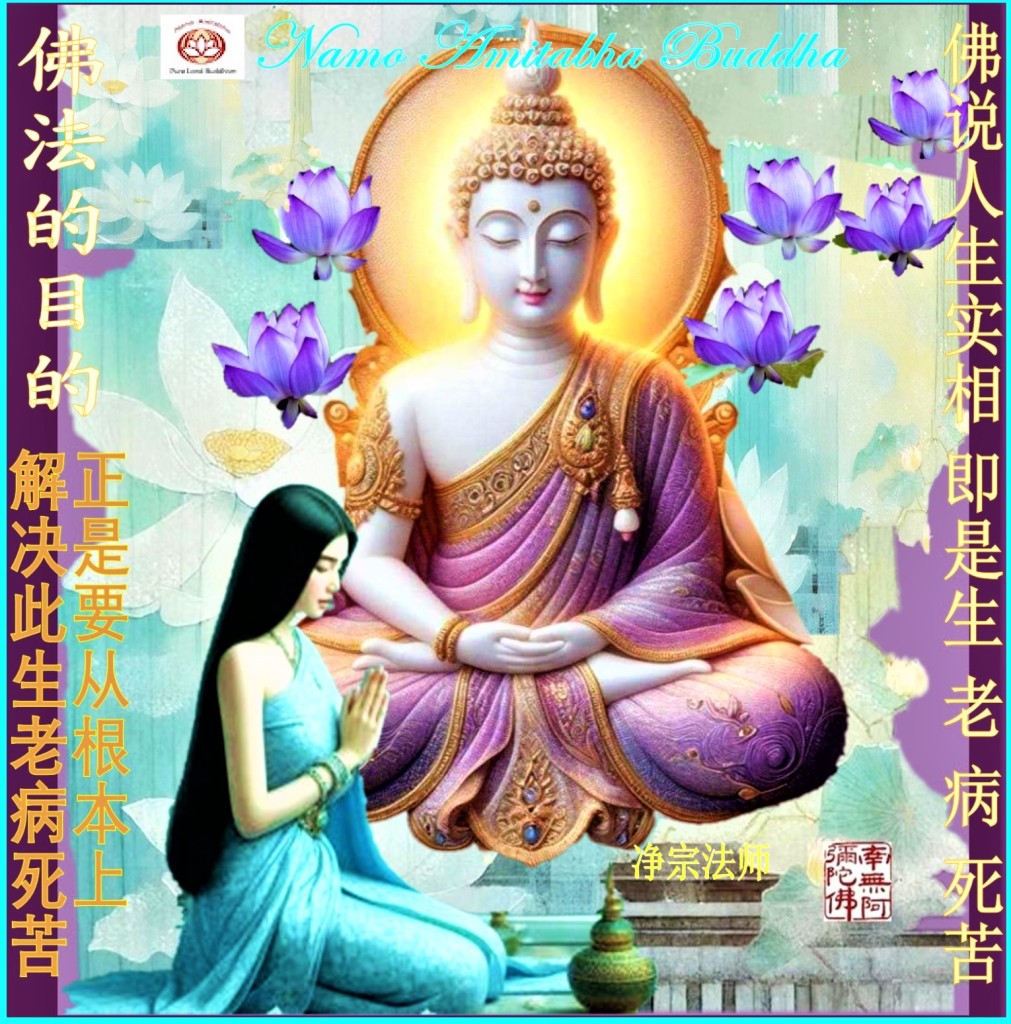

![]() benefits of accomplishing the karma of rebirth in this life while he is still alive
benefits of accomplishing the karma of rebirth in this life while he is still alive![]() 平生业成
平生业成![]()






